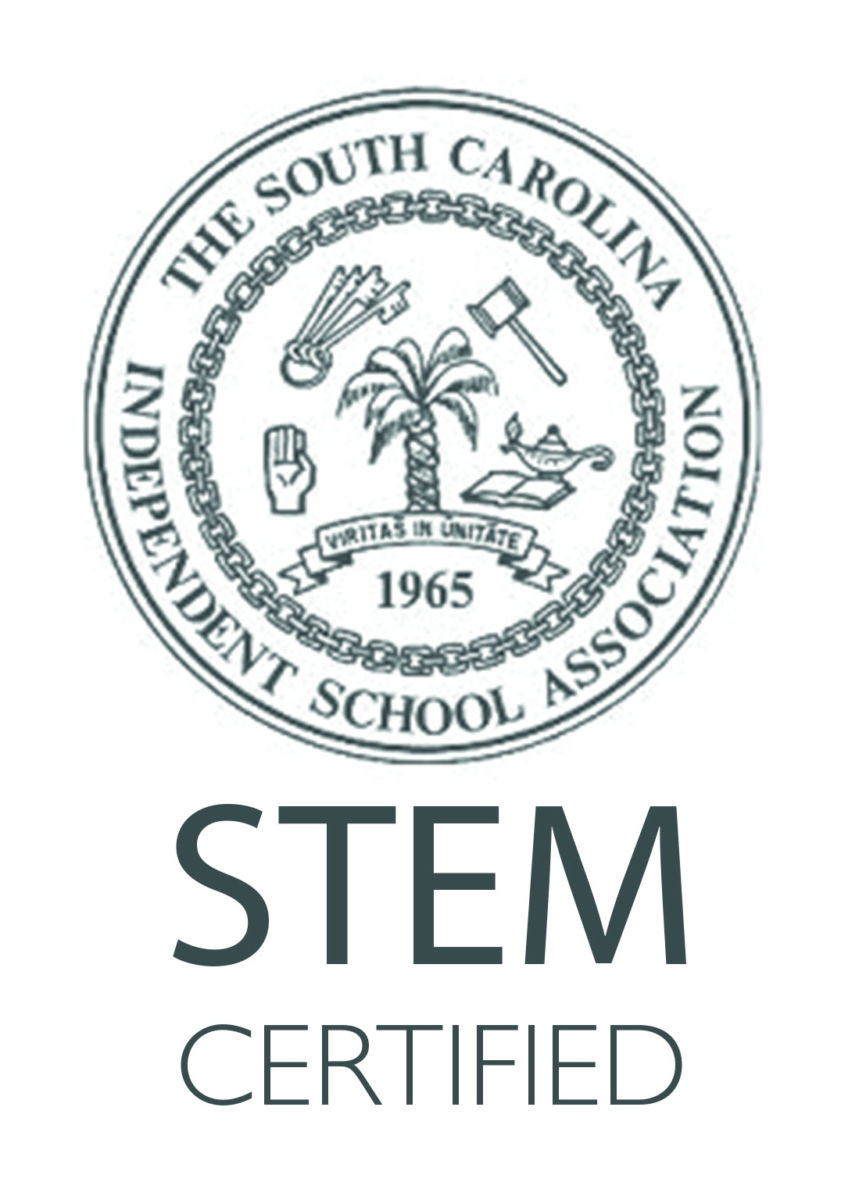S.T.E.A.M. Program and Academic Activities
Wilson Hall is a certified Science, Technology, Engineering, Arts and Math (STEAM) school by the South Carolina Independent School Association (SCISA). To earn the certification, the school met SCISA STEAM standards that include having an inquiry-based learning environment for students that encourages problem-solving, students working independently and collaboratively, and students demonstrating creative and critical thinking.
Other STEAM standards include students using technology resources to conduct research, learning through performance-based assessments, and students demonstrating oral and verbal communication skills to express and elaborate their conclusions. STEAM activities are incorporated into classes, involving hands-on activities to enhance and compliment traditional teaching methods. Students in each class, from three-year-old preschool through twelfth grade and across all academic disciplines, participate in STEAM activities.
Physical Science Calculates Motion Outdoors
.jpg)
Heading beyond the classroom walls, physical science students transformed the campus into a living laboratory as they investigated distance, displacement, speed, and velocity. Following assigned routes to walk and run, they collected real-time data and used it to calculate each measurement, bringing formulas to life through movement. The lesson, taught by Mrs. Ashley Morris, showcased the impact of active, hands-on learning.
Muscles in Motion in Anatomy
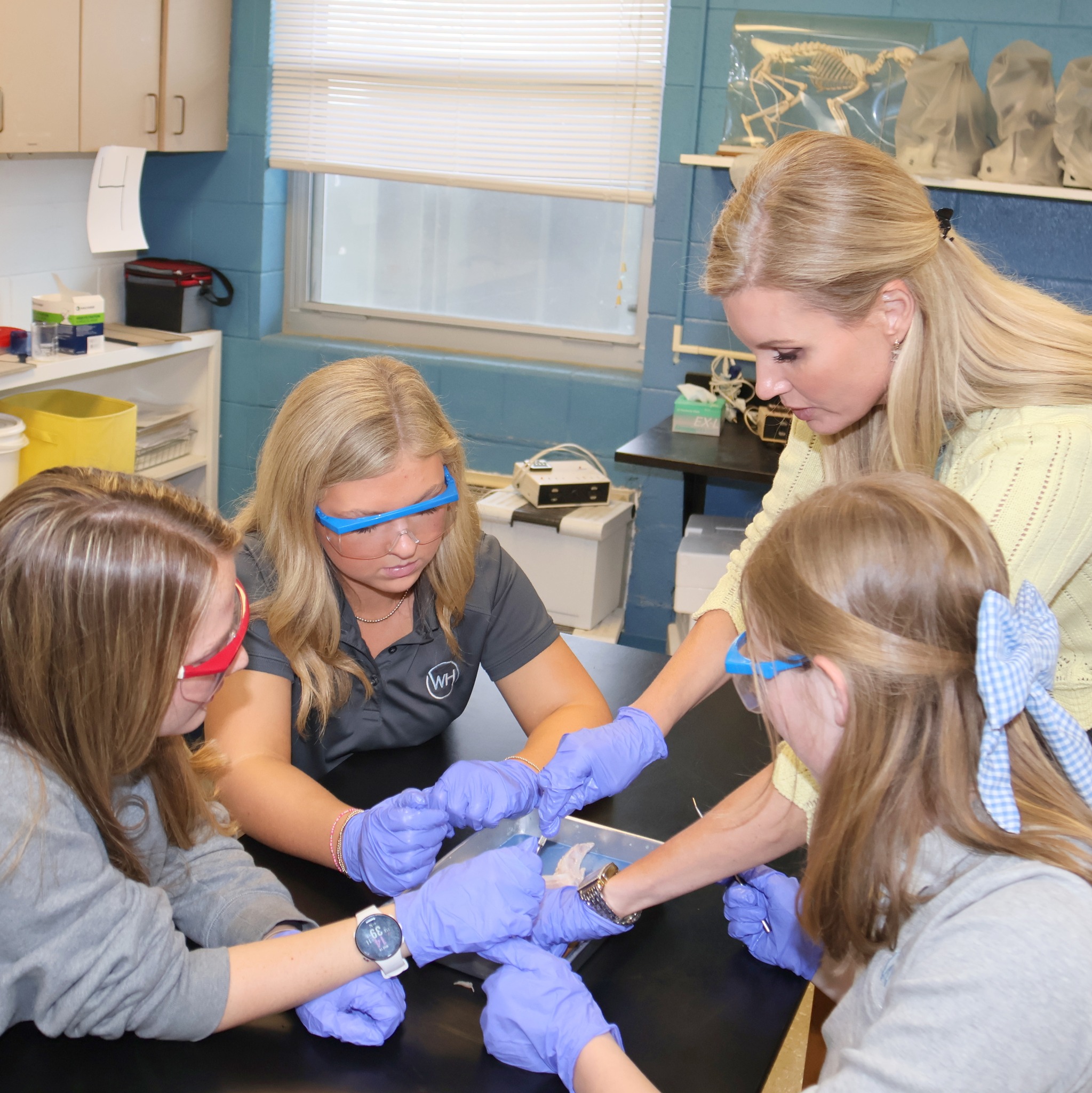
Examining form and function up close, students in Mrs. Ashley Morris’s anatomy class brought their study of muscles to life by dissecting chicken wings. This hands-on lab allowed them to observe tendons, ligaments, and muscle groups in action, deepening their understanding of how the human body moves and reinforcing academics in action through real-world application.
French Classes Celebrate Crêpe Day

Transforming the cafeteria into an extension of the classroom, students in Mr. Scott Warren’s French classes participated in a Crêpe Day cultural activity. After Mr. Warren prepared several liters of batter the night before, students cooked their own crêpes and selected toppings such as Nutella or fruit jam, engaging in hands-on learning that brought French language and tradition to life beyond the traditional classroom setting.
P is for Pancakes & Pajamas
.jpg)
Ending the week with smiles and syrup, Preschool 3 students celebrated the letter P through fun, hands-on crafts and activities, including pancake and penguin projects, painting with pom-poms, making patterns, and even walking like penguins. The week concluded with a cozy Pajamas & Pancakes Day, making learning the letter P a joyful and memorable experience.
Threads of French Identity
.jpg)
Creating with purpose, students in Mr. Scott Warren’s French III class are designing and stitching French and Francophone symbols into needlework tapestries and will present the meaning of their chosen symbols to the class, blending creativity with cultural learning through hands-on experience.
100 Days Smarter
.jpg)
Dressing as centenarians, kindergarten students joyfully celebrated the 100th day of school with a day full of fun and learning. Students incorporated the number 100 into hands-on activities and projects, using snacks as manipulatives and completing creative math challenges, like counting 100 licks of a lollipop, making this milestone a memorable blend of play and academics.
101 Days of Learning and Fun
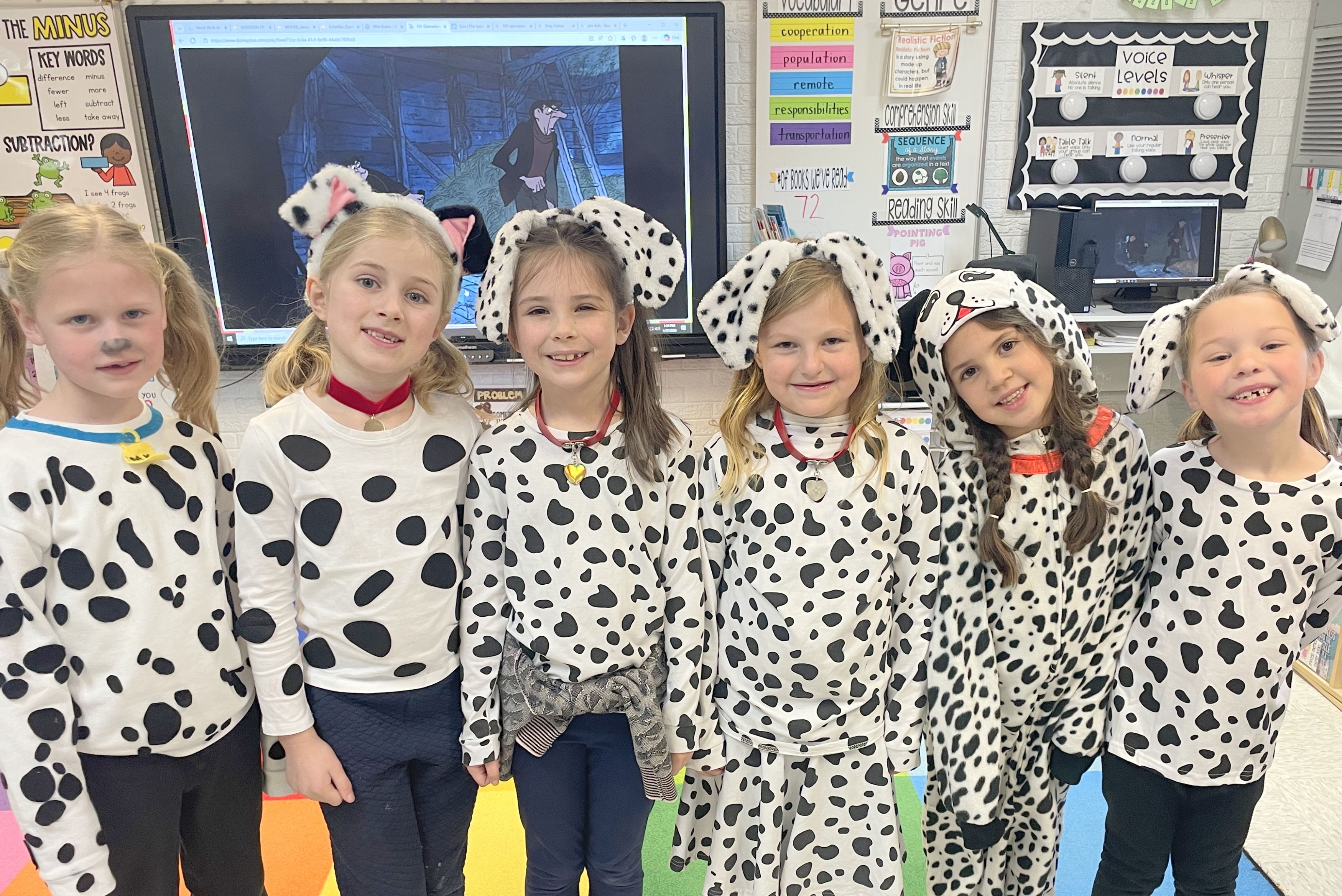
First grade students celebrated their 101st day of school in spirited fashion, transforming the hallways into a sea of spots, ears, and wagging tails as they dressed up as characters from 101 Dalmatians. The milestone day blended creativity and academics, allowing students to enjoy the excitement of dressing up while participating in meaningful, hands-on learning activities inspired by The Hundred and One Dalmatians by Dodie Smith and the classic Disney film.
Students strengthened their math skills by drawing 101 spots on Dalmatian illustrations and practiced reading and writing by searching the room to find and record 101 words. They also created Dalmatian-themed hats and enjoyed a playful snack of “dog bones” (pretzels) and “dog spots & dots” (mini marshmallows and chocolate chips). The celebration offered a fun, memorable way to reinforce important skills while marking an important milestone in the school year.
Learning Across Generations in Spanish
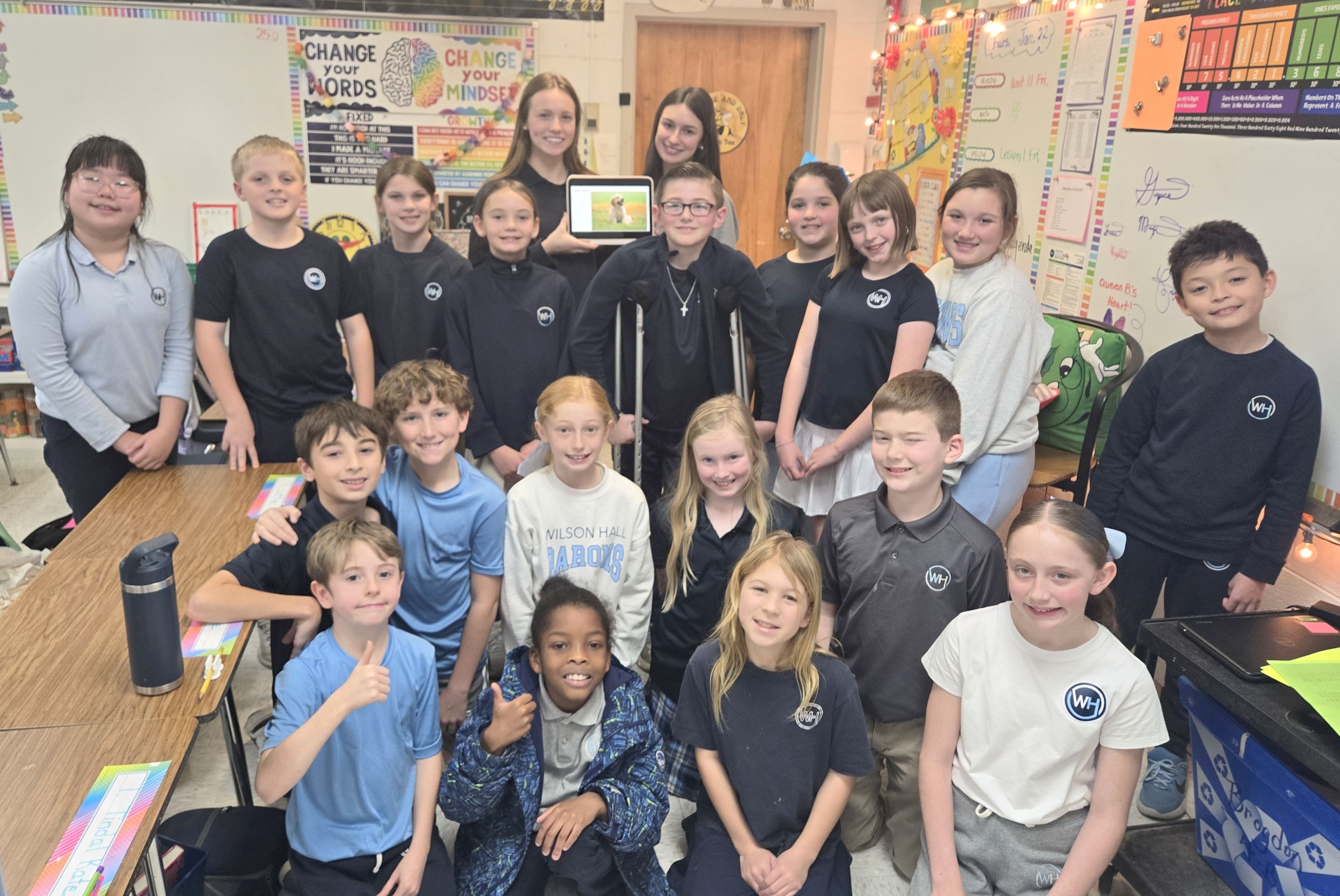
Bridging classrooms and ages, AP Spanish students Morgan Aycock and Ella Sill collaborated with a fourth grade class to present engaging Spanish lessons they designed themselves. Guided by Mrs. Emily Jackson, the project highlights intergenerational learning as students teach, learn, and inspire one another through shared language and meaningful educational experiences.
Set Design Creates World of Cinderella
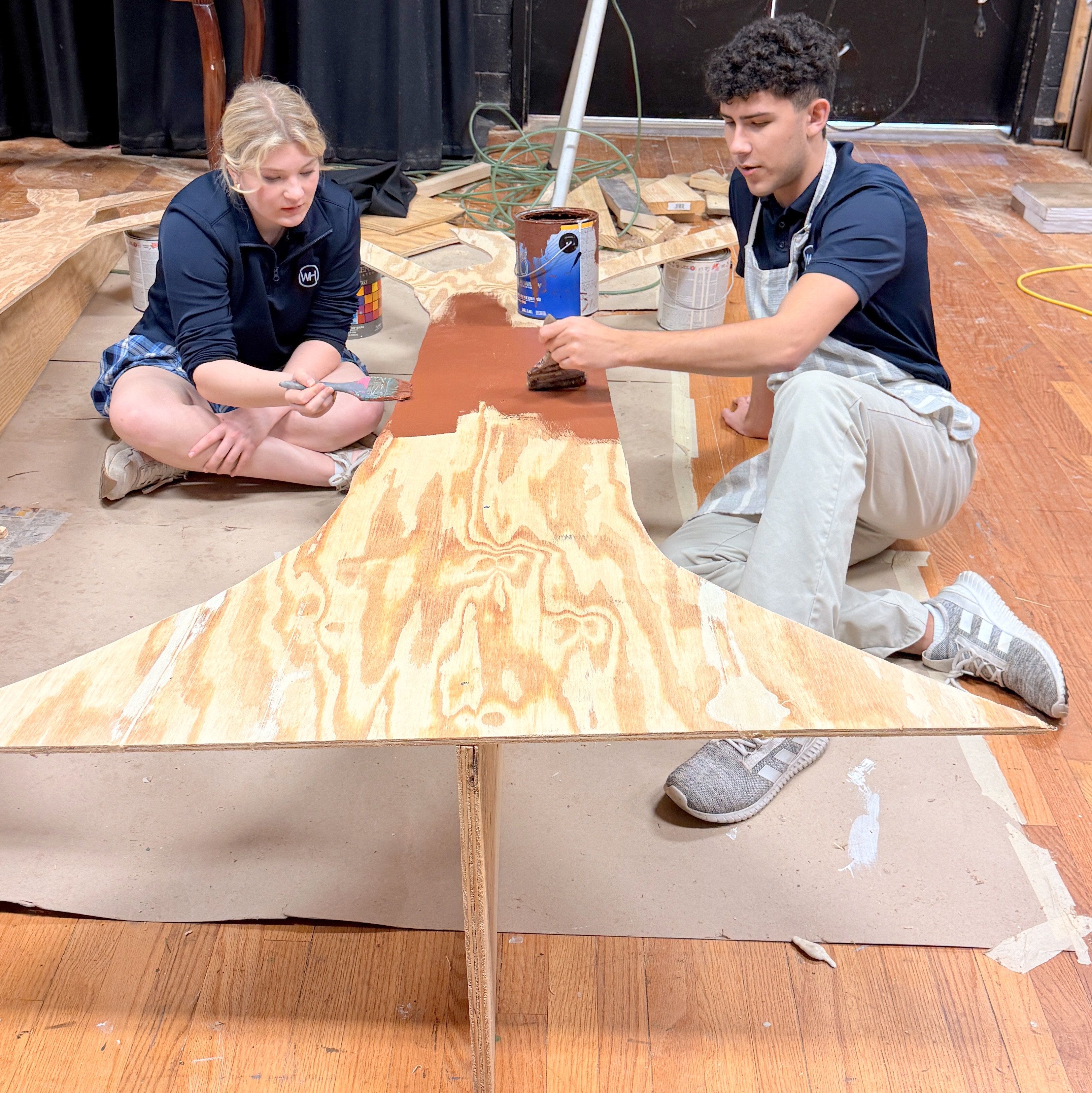
Putting creativity and craftsmanship to work, students in the Set Design and Construction class are hard at work creating the sets for the spring musical, Rodgers & Hammerstein’s Cinderella. Guided by Ms. Tara Breslin-Schumacher and Mr. Steve Hudson, students are showcasing their artistic vision and design skills as they bring the world of the show to life, one carefully built piece at a time.
Kindergarten Learning in Action: Catapult Experiments
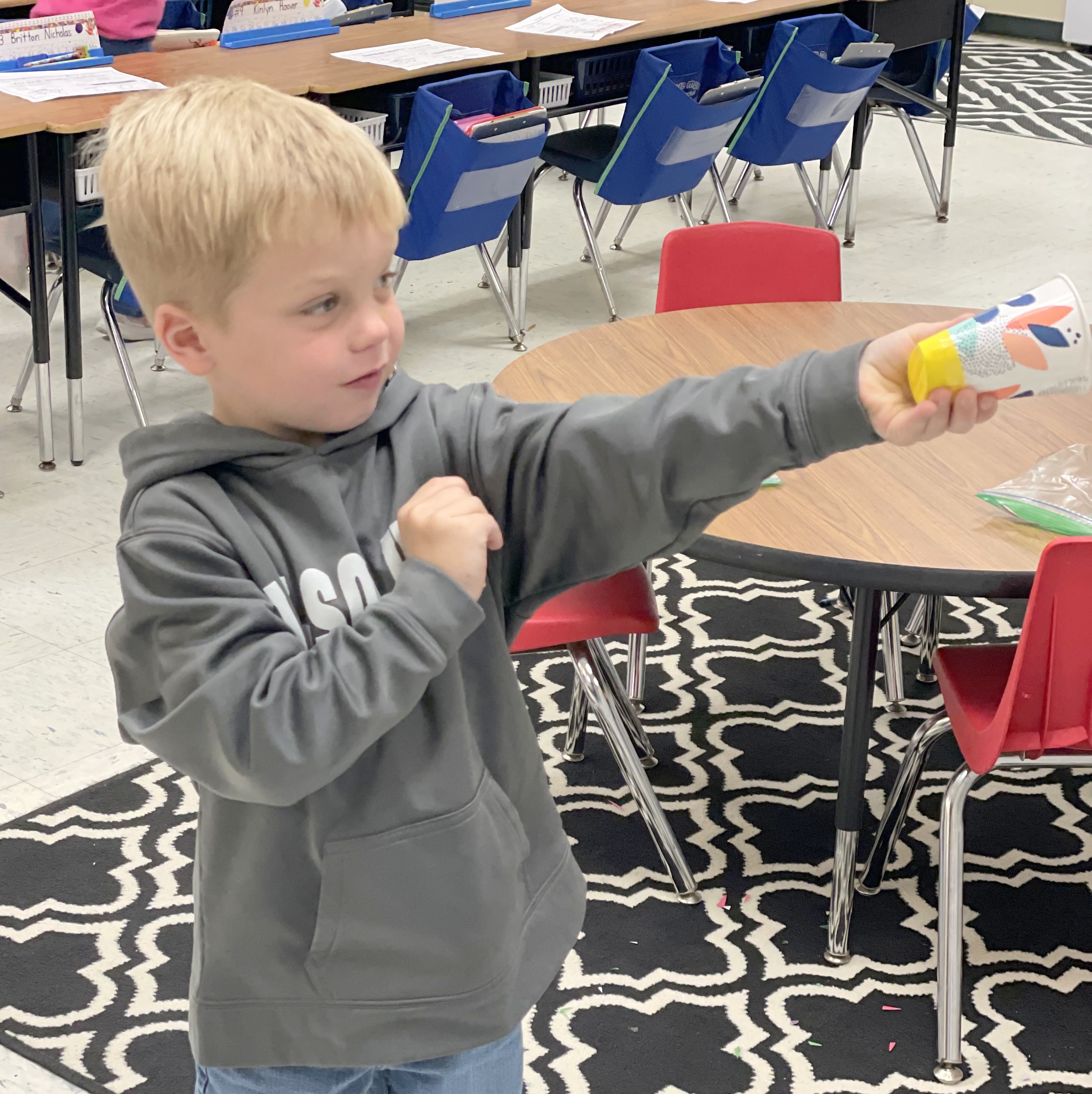
Kindergarten students learned through hands-on experimentation while having fun as they explored the scientific method by building and testing catapults. After asking a question and forming a hypothesis, students collected data using a bar graph and carried out their experiment to see which would travel farther, a marshmallow or a pom pom. Learning came to life as curiosity, problem solving, and play worked together in the classroom.
Preschool 3 Learning in the Dark
.jpg)
Preschool 3 students combined learning and fun during a hands-on lesson focused on the letter N and nocturnal animals. Using flashlights, students took part in a nocturnal number hunt, searching for numbers 1–6 to strengthen number recognition skills. The activity kept every student engaged while reinforcing key concepts through playful, active learning.
Experiencing the Aging Process in AP Psychology
.jpg)
Stepping into the challenges of aging, AP Psychology students engaged in hands-on simulations to experience what arthritis, glaucoma, and hearing loss can feel like. Through this interactive lesson, students deepened their understanding of the physical, cognitive, and psychosocial aspects of development and aging. The class is taught by Mrs. Allyson Sanders.
A Patriotic Mystery Reader
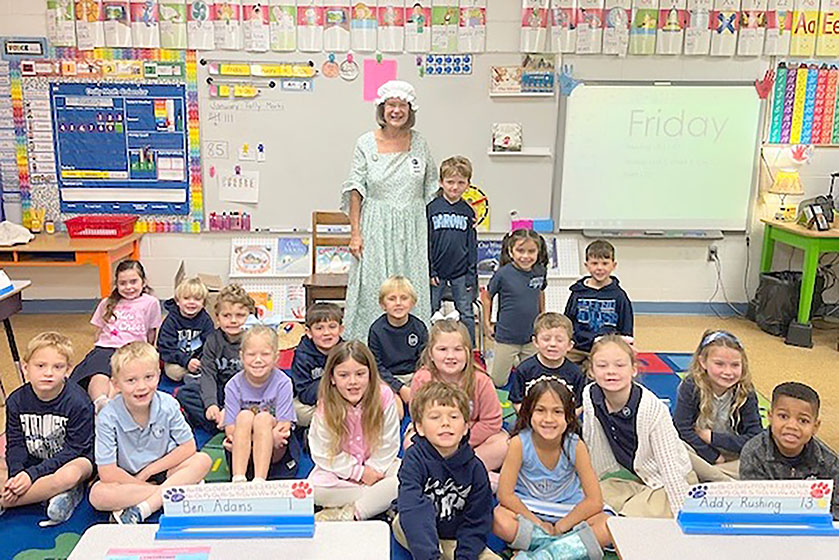
Mrs. Hope Alexander’s kindergarten class enjoyed a special Mystery Reader last Friday as Mrs. Melanie Franks, grandmother of Tug Jenerette, visited from Summerville to read In 1766 and share about the upcoming 250th anniversary of the Declaration of Independence. A retired first grade teacher and Community Classrooms Chair for the DAR chapter in Summerville, Mrs. Franks brought the lesson to life by dressing in costume and surprising students with 250th anniversary gifts, including hats, medals, patriotic candy, and puppets to make.
Health & Human Development Takes Learning Outside
.jpg)
Stepping outside enhanced academic learning as students in Mrs. Allyson Sanders’ Health & Human Development class completed a hands-on lab focused on vital signs and medical terminology. During the outdoor lab, students measured pulse rates and examined normal body functions to better understand homeostasis and explore reasons vital signs can sometimes be abnormal.
AP Literature’s “Road to Bethlehem” Project
.JPG)
Students in AP Literature bring their semester of reading to life by creating a symbolic journey toward Bethlehem that weaves together every major work studied, with each component mapped onto a character or element from the Nativity narrative. Their culminating posters highlight key themes, literary devices, and personal insights as they identify moments of new beginnings, offer “gifts” of meaningful quotations, trace guiding lights in the texts, and reflect on humility, revelation, courage, and the shadowed path that “slouches towards Bethlehem.” The project blends scholarship with imagination and is taught by Mr. Brent Kaneft.
Creative Cookie Computer Lab
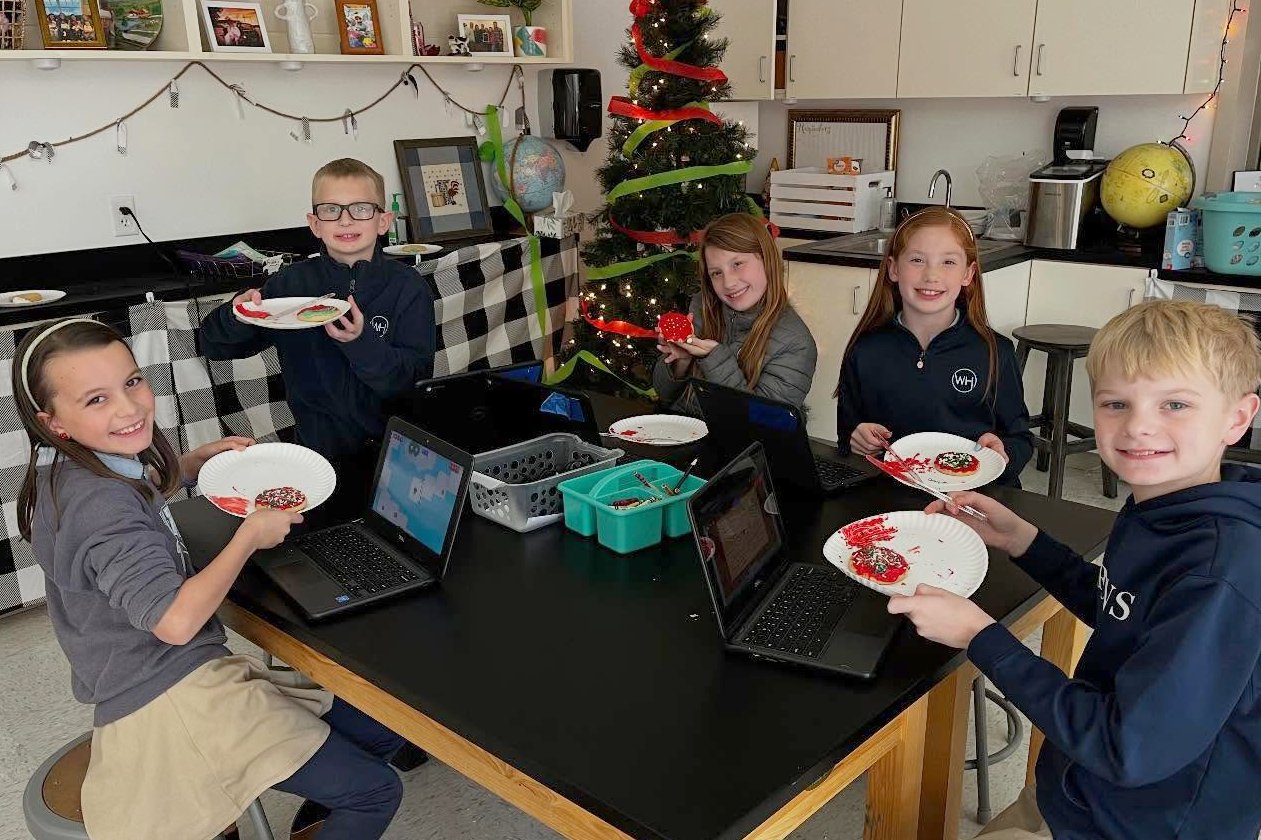
Bringing creativity to life, lower school computer science students turned a fun STEAM project into a sweet hands-on experience as they designed sugar cookies on Google Jamboard in Mrs. Emma Ayres’s class. After Mrs. Ayres baked real cookies to match their digital designs, students decorated their treats, snapped cookie selfies on their Chromebooks, and enjoyed every bite of their edible creations.
Potato Santas on Parade
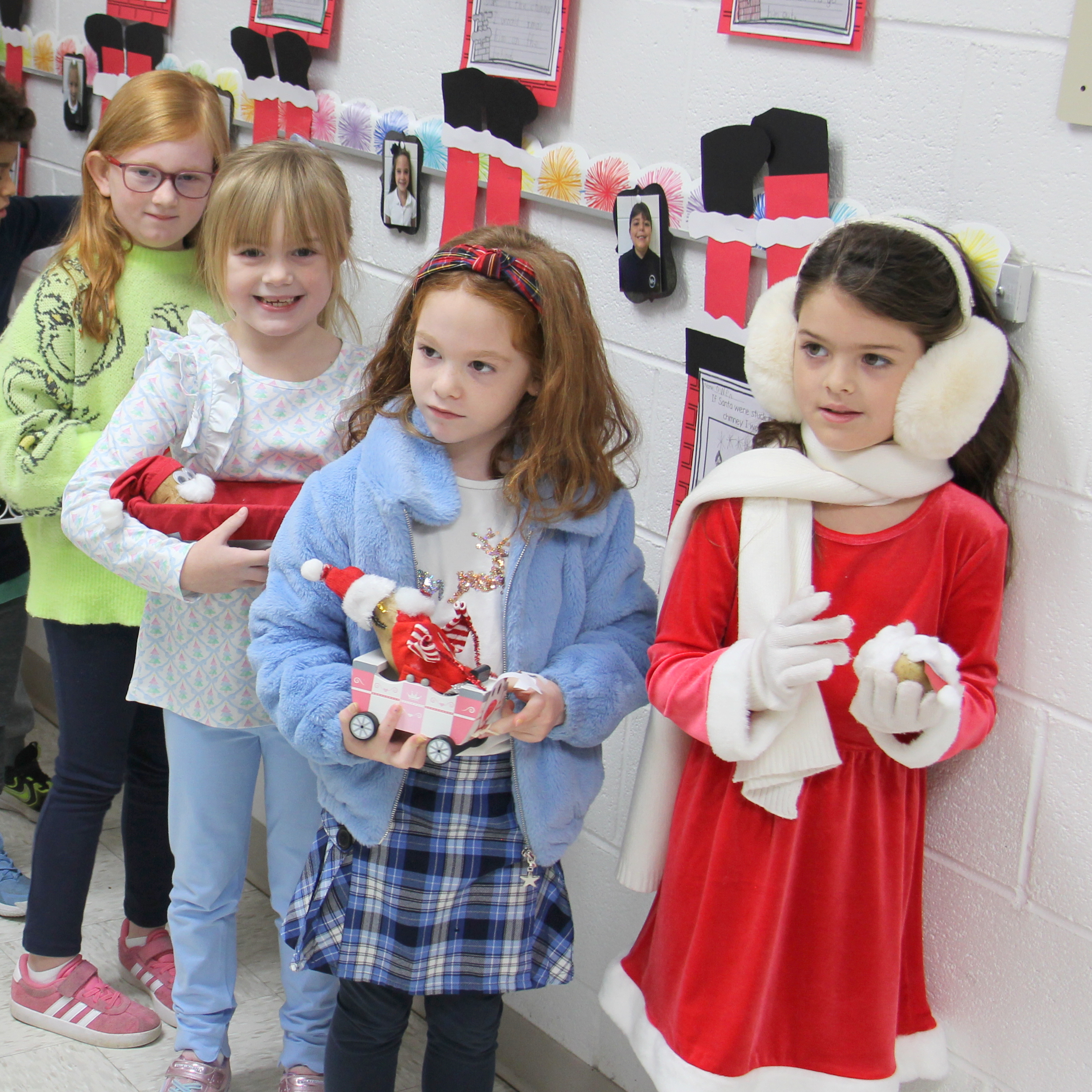
Bringing Christmas spirit to life, our first graders kicked off the annual Potato Santa Parade, a fun holiday tradition that turns an ordinary potato into a festive Santa masterpiece. Students proudly showcased their imaginative creations as they travelled throughout campus, posing for photos and spreading cheer to everyone they met. It is a simple project that sparks big creativity and even bigger smiles.
Racing Through Review in English 12
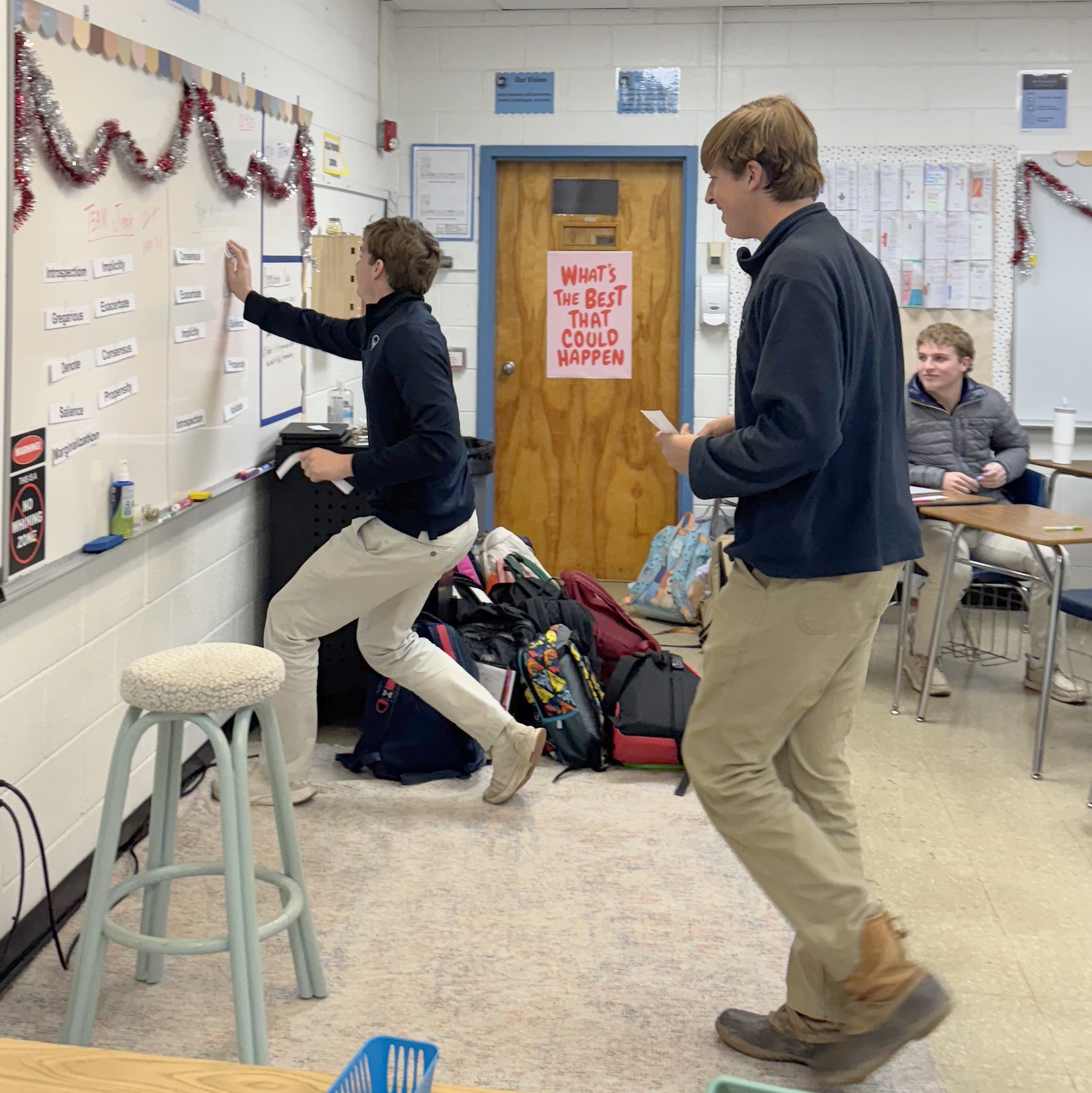
Team Jingle took on Team Bells in a fast-paced vocabulary relay race in Mrs. Ashley Cook’s English 12 class, with students racing to match definitions with the correct vocabulary words. Each team member located their numbered definition, sprinted to the board to choose the right term, and quickly took a seat while Mrs. Cook verified each pairing for points. After a spirited competition, Team Jingle claimed the victory.
Learning in Motion: Statistics on the Court
.jpg)
Putting probability into play, AP Statistics students took to the court for a hands-on free-throw simulation that turned data collection into an active learning experience. Each student attempted 40 shots to determine their individual shooting probability before combining results to analyze class-wide trends, compare long-run and short-run behavior, and create Venn diagrams showing who scored above or below the class average. The class is taught by Mrs. Jessica Duke.
ChemisTREE Tradition Lights Up the Lab
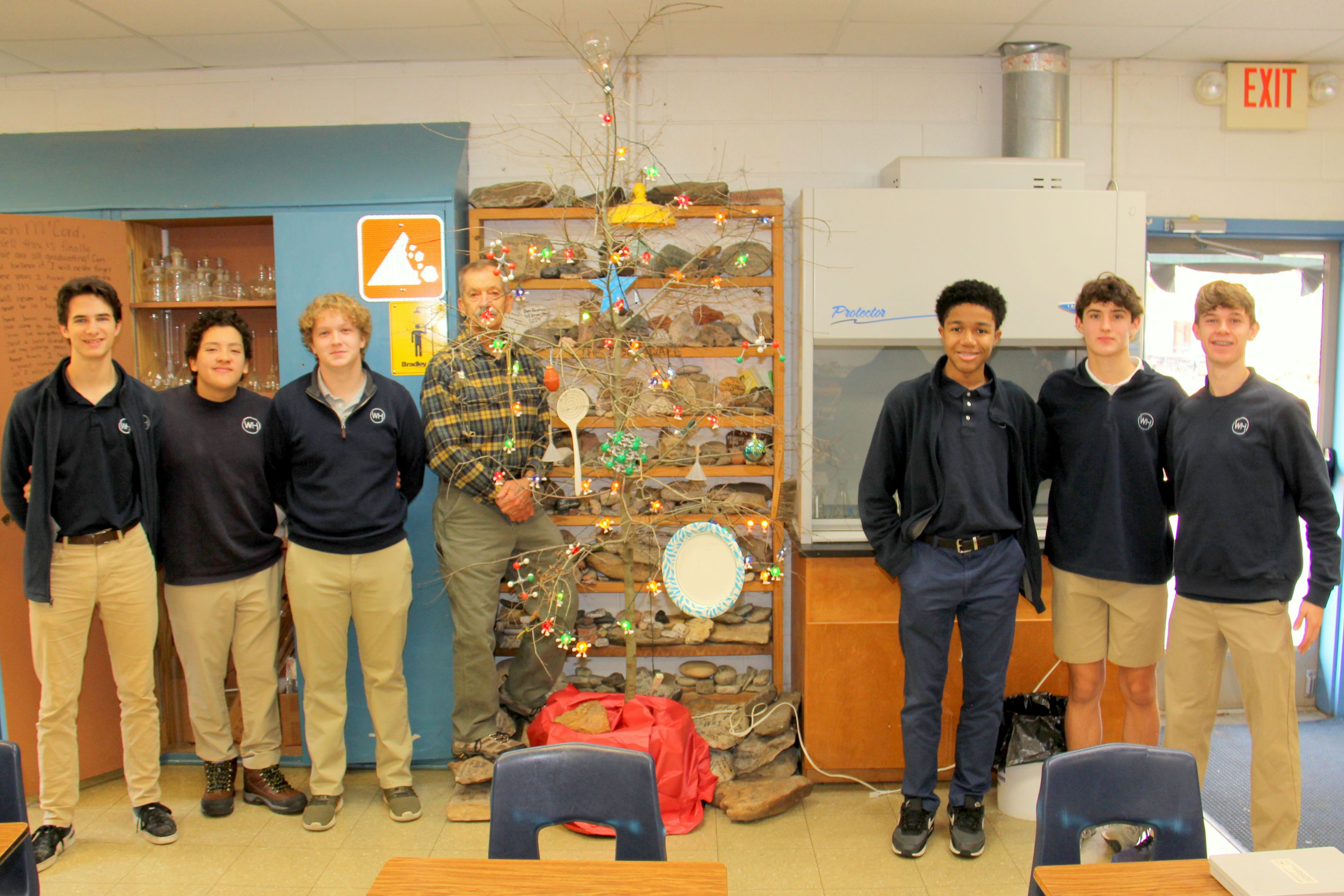
Kicking off the holiday season with a clever twist, AP Chemistry students decorated their ChemisTREE using items found right in the lab. This long-standing holiday tradition adds a festive spark to the class, led by Mr. Chuck McCord, the school’s most tenured faculty member now celebrating his 44th year of teaching at WH. Mr. McCord stands as a shining example of the experience, dedication, and continuity that define our exceptional faculty.
Designing & Printing Holiday Creativity
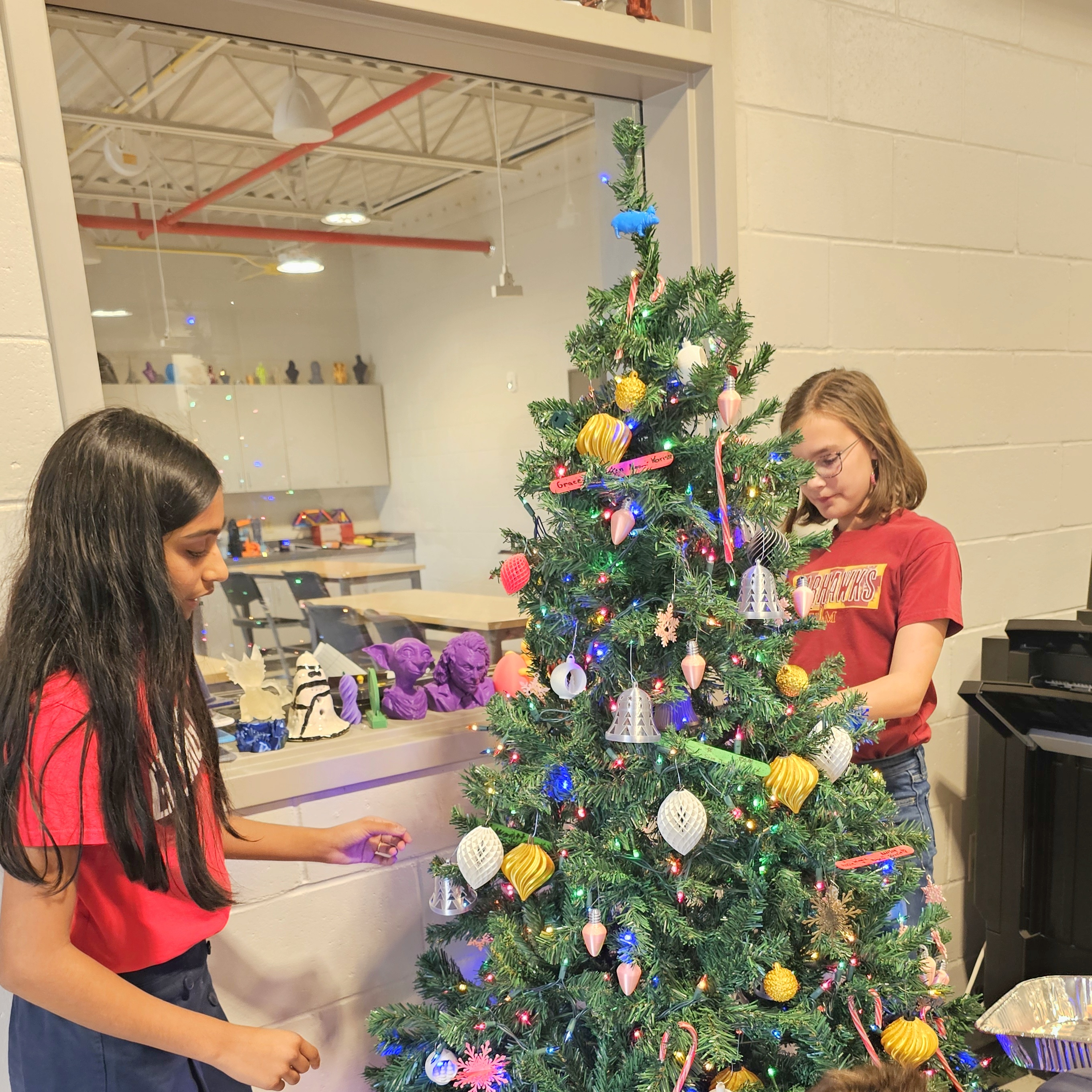
Building real-world skills through hands-on design, students in the robotics classes created Christmas ornaments using Wilson Hall’s fleet of over two dozen 3D printers. As part of a class assignment, they modeled their own ornament designs before bringing them to life layer by layer. Wilson Hall offers Robotics I - III for high school students, along with a robotics course for 7th grade, all taught by Mrs. Leann Tuders, giving students practical experience with technology & engineering tools.
Talking Turkeys Take the Podium in AP English Language
.JPG)
Turning a Thanksgiving tradition into a fun way to learn, AP English Language students took on named turkey personas to craft speeches arguing for a presidential pardon. Without costumes but fully in character, they chose strategic rhetorical moves and matching tones to persuade the audience their turkey should be spared, blending creativity, voice, and argument. The class is taught by Mrs. Molly Matthews.
AP Psychology Studies Sleep, Substances & the Brain
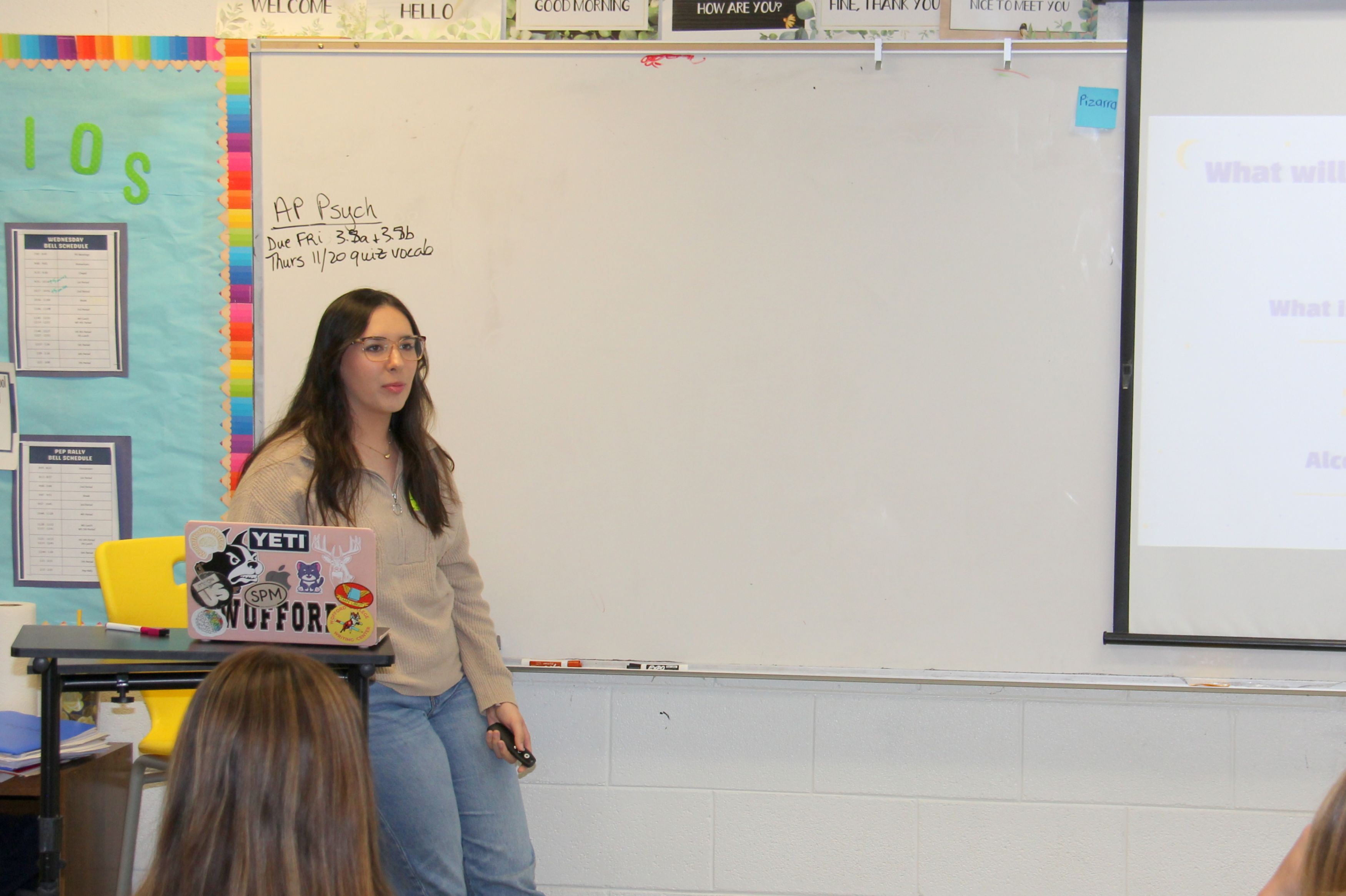
Chanson Bullard ‘22, who is majoring in biology and psychology with a concentration in neuroscience at Wofford College, visited the AP Psychology classes taught by Mrs. Allyson Sanders. Having recently completed a unit on sleep and the brain, students connected her outreach presentation for her Neuroscience of Sleep class, in which she explained the effects of alcohol and stimulant use on sleep, to what they had just studied.
Environmental Science: Building Better Wetlands
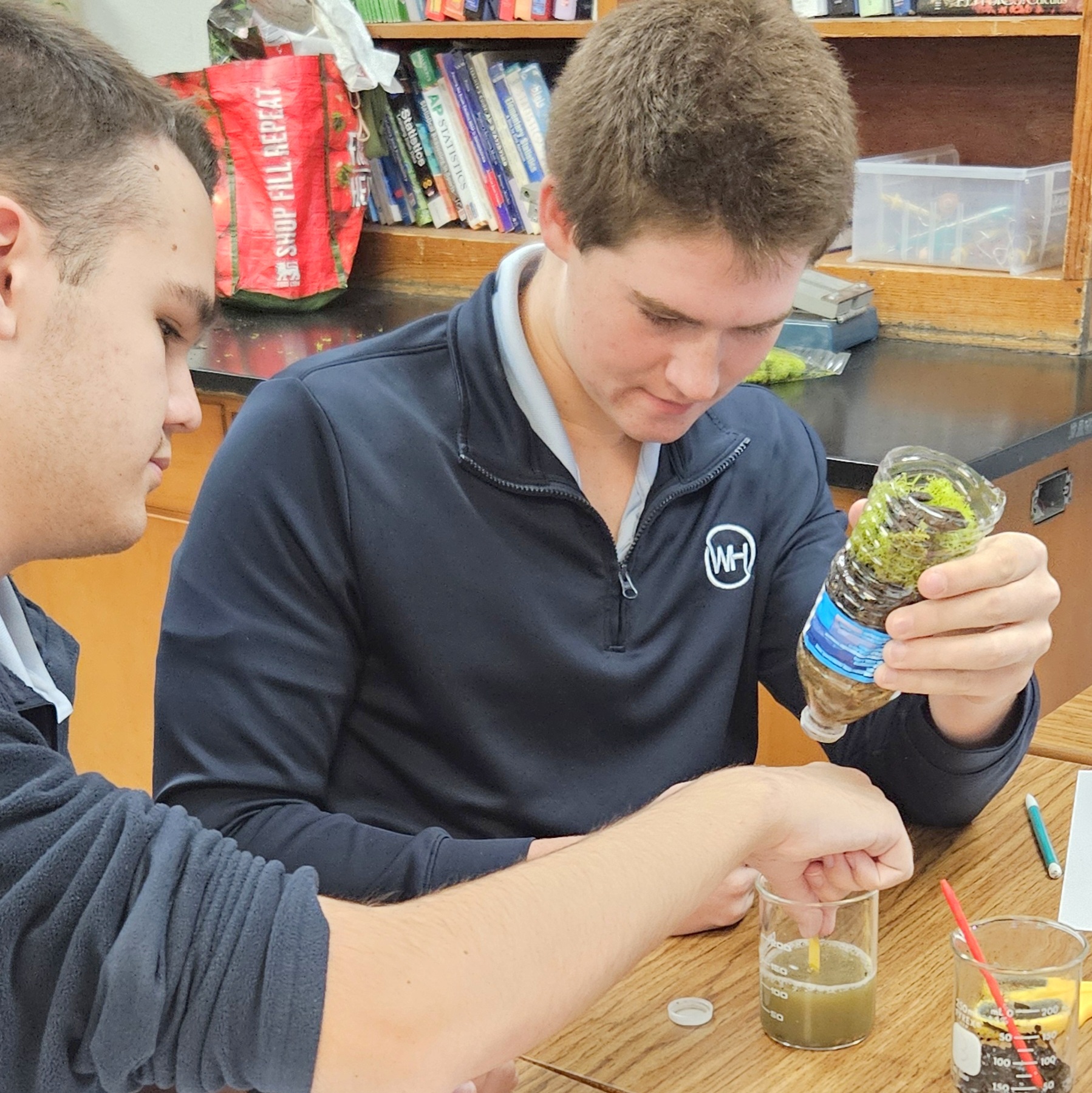
Exploring how wetlands naturally filter our water, Environmental Science students wrapped up their unit on terrestrial & aquatic biomes with a hands-on wetland lab. After learning how vital wetlands are to healthy ecosystems, students built their own miniature wetlands using layered models of filter, gravel, sand, soil & moss. They then tested how effectively wetlands clean water by measuring the pH of dirty water before and after running it through their filtration models. Mrs. Jessica Duke is the teacher.
Second Graders Tap Into Learning at Water Treatment Plant
.jpg)
Highlighting how Wilson Hall uses local places as valuable educational resources, second graders visited the Pocotaligo Water Treatment Plant to deepen their understanding of Community Helpers. Students saw firsthand how clean, reliable water is produced for Sumter, connecting classroom lessons to real community operations. The experience offered meaningful, real-world learning guided by Mrs. Lynn Davis, Mrs. Jordan Logan & Mrs. Carla Talley.
Stepping Into History at Colonial Day
.jpg)
Stepping out of the classroom and into the past, 4th-graders brought their U.S. History unit to life during Colonial Day at the Carolina Backcountry Homestead at the Sumter County Museum. Dressed in period costume, students rotated through hands-on stations such as colonial cooking at the hearth and a militia drill while exploring the recreated log cabin, settler’s house & blacksmith shop. Parent volunteers and teachers, also in costume, partnered with museum staff and volunteers to guide each activity, showcasing the strong tradition of parental involvement that enriches learning at WH. The teachers are Mrs. Tammy Amick, Mrs. Laura Brogdon & Mrs. Megan Zimmerman.
Collaborative Learning in Senior Seminar
.jpg)
Centered on collaboration and multi-modal learning, Senior Seminar divides the class into two teams while each senior individually sequences their chapter events and contributes to the group’s 13-chapter timeline. Midway through Tara Westover’s Educated, students explore themes of education, family history, delusion, and entrapment through discussion, visual mapping, and evidence-based annotation. The class is taught by Mrs. Ashley Cook.
Modeling the Membrane in Biology
.jpg)
How do students grasp cell membranes? By building them. In Mrs. Ashley Morris’s biology class, a STEAM-focused, hands-on activity used gumdrops, pipe cleaners & construction paper to model membrane structure and function, turning simple materials into a clear understanding of complex biology.
Exploring Surface Tension Through Hands-On Science
.jpg)
Putting STEAM learning into action, 5th-grade students conducted a hands-on lab to explore the concept of surface tension in Mrs. Frances James’ science class. Through interactive experiments and observation, students discovered how cohesive forces in water create tension strong enough to support light objects, deepening their understanding of scientific inquiry and real-world phenomena.
Government Kickball Review

Kicking learning into high gear, government students took their review outdoors with Government Kickball. Before each kick, players fielded a question spanning topics from the Constitution to case law; a correct answer earned a kick, while a miss required a quick task before first base such as pirouettes or a crab walk. The activity was a fun way to study and be outside while reviewing material taught by Mr. Sean Hoskins.
Marshmallow Mechanics in AP Physics
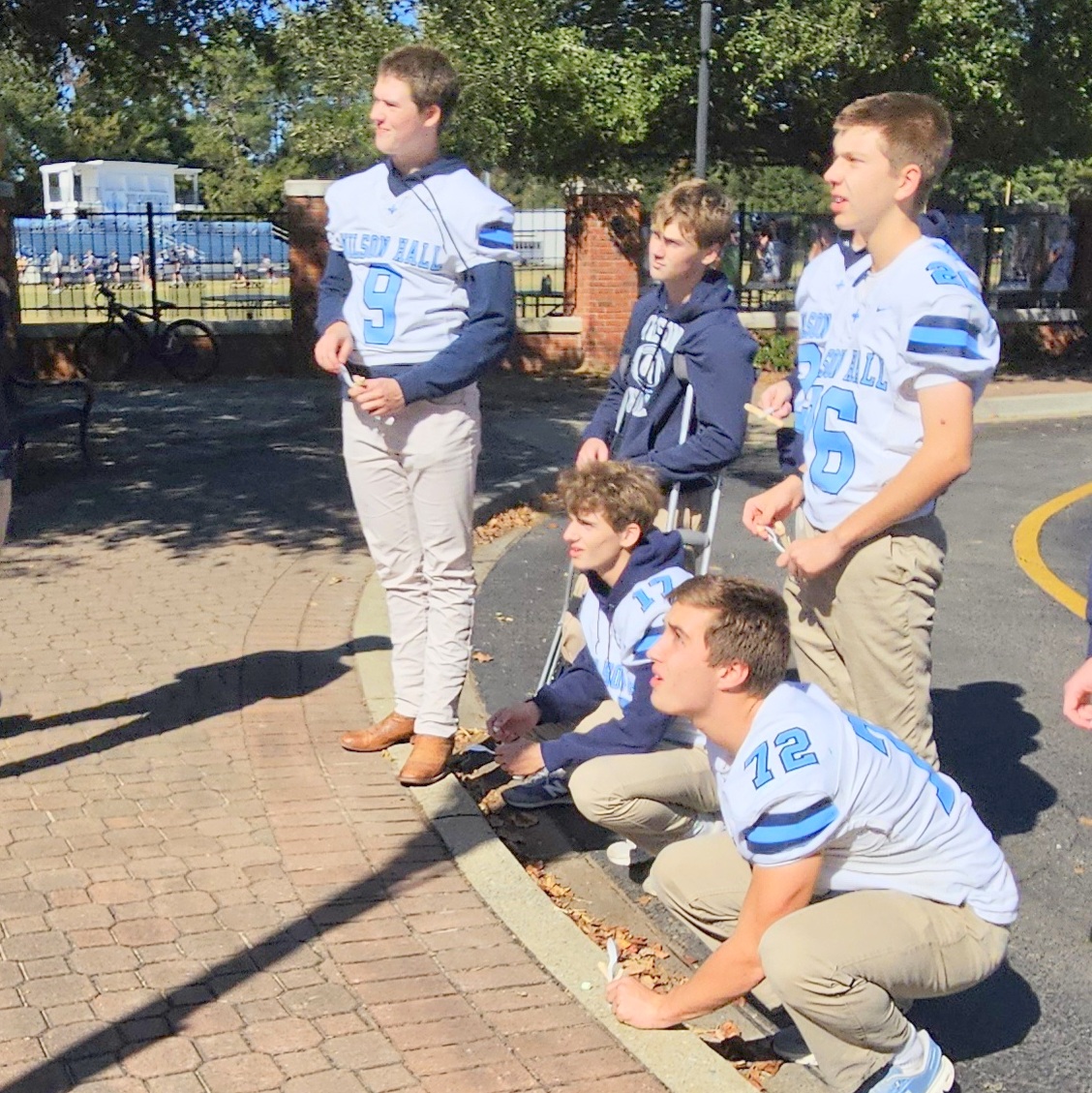
Launching learning into the open air, AP Physics students took their lesson outdoors to investigate how potential energy converts into kinetic energy. Working in teams, they designed and built mini catapults to launch marshmallows, tested and refined their prototypes, then competed to see whose design sent a marshmallow the farthest. The hands-on challenge blended collaboration, iteration, and real-world physics, guided by Mrs. Jessica Duke.
Police Pups & Community Pride
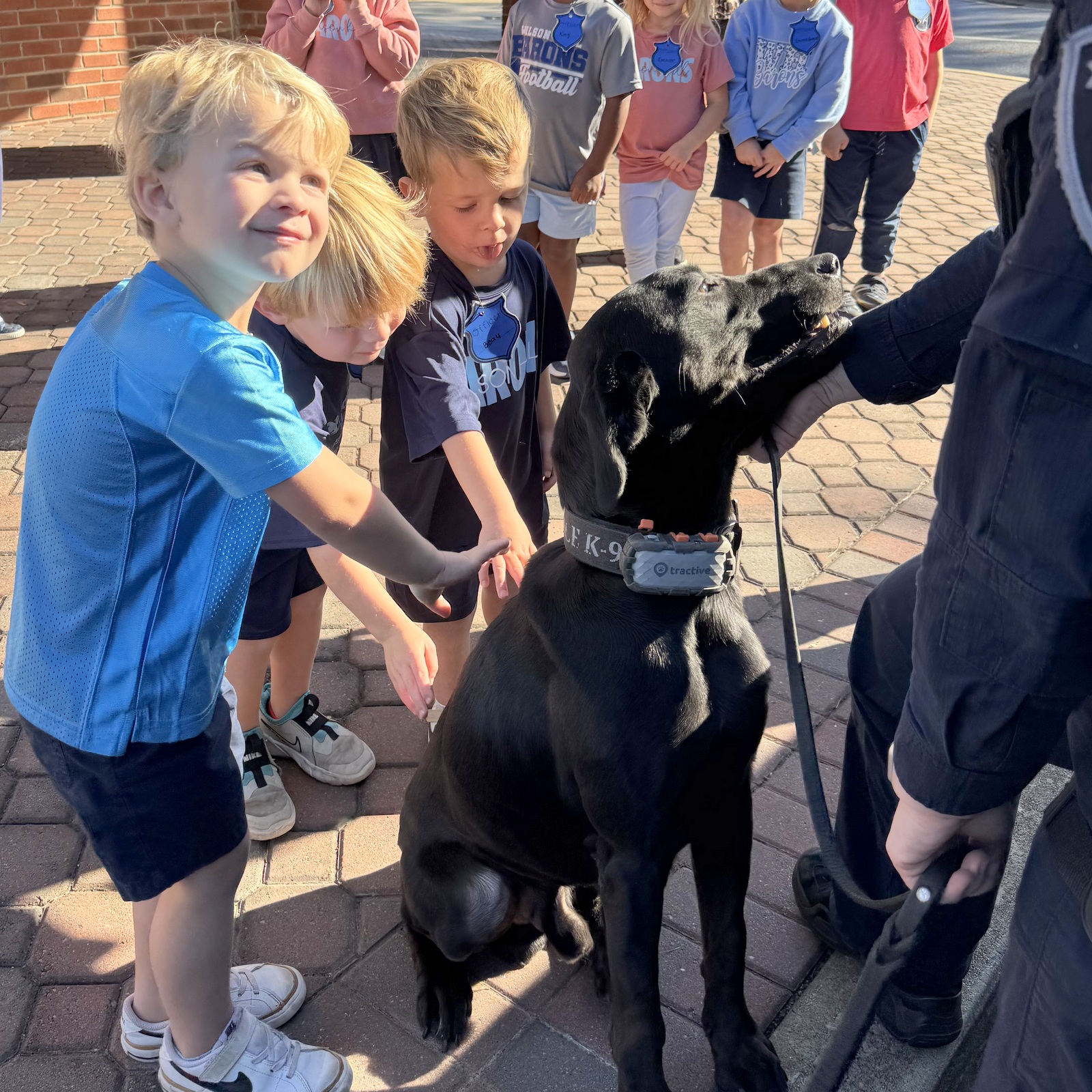
Bringing learning to life, Preschool 3 students continued Community Helper Month with a visit from the Sumter Police Department and Marco from the K-9 unit. Sgts. Gary Atkinson & James Sinkler and Lt. Corporal Mary House shared how officers protect and serve, teaching students about safety and the important work of police dogs. The highlight of the day was meeting Marco and discovering how K-9s help keep the community safe.
Strengthening Writing Through Collaboration
.jpg)
Building stronger writers through collaboration, students in AP Language & Composition participated in a peer-editing session following a timed argumentative essay on the prompt, “To what extent is competition valuable?” By reviewing their classmates’ work, offering constructive feedback, and engaging in discussion, students refined their analytical and writing skills. The process encouraged critical thinking and revision, allowing each student to strengthen their essay before final submission. The class is taught by Mrs. Molly Matthews.
Studying Bones in Anatomy
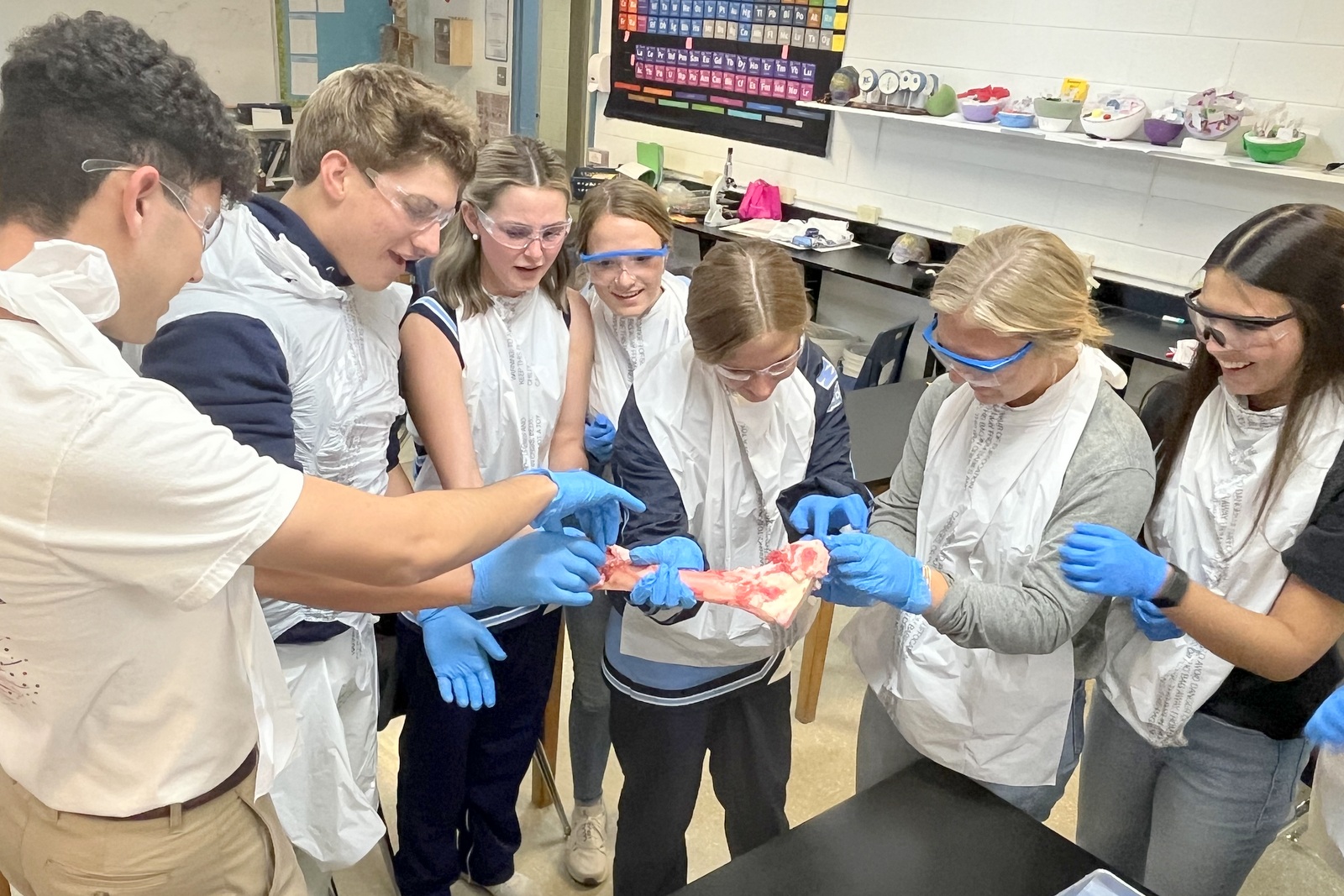
Engaging in hands-on learning, students in Honors Anatomy used real cow bones to study the structure and function of a long bone. Through direct observation, they explored features such as the bone marrow, medullary cavity, endosteum, and periosteum, deepening their understanding of skeletal anatomy. The interactive lab, taught by Mrs. Ashley Morris, brought textbook concepts to life in a memorable and practical way.
Exploring the Journey of Discovery in U.S. History
.jpg)
Tracing the famous Lewis & Clark expedition, students in U.S. History followed a detailed timeline through ten interactive hallway stations featuring maps, photos, and key facts from each stop. Working in small groups, they recorded their main observations from every leg of the journey before presenting their findings to the class. The engaging activity, taught by Mrs. Lori Brown, promoted collaboration, critical thinking, and a deeper understanding of westward expansion.
Preschool 3 Sparks Fire Safety Learning
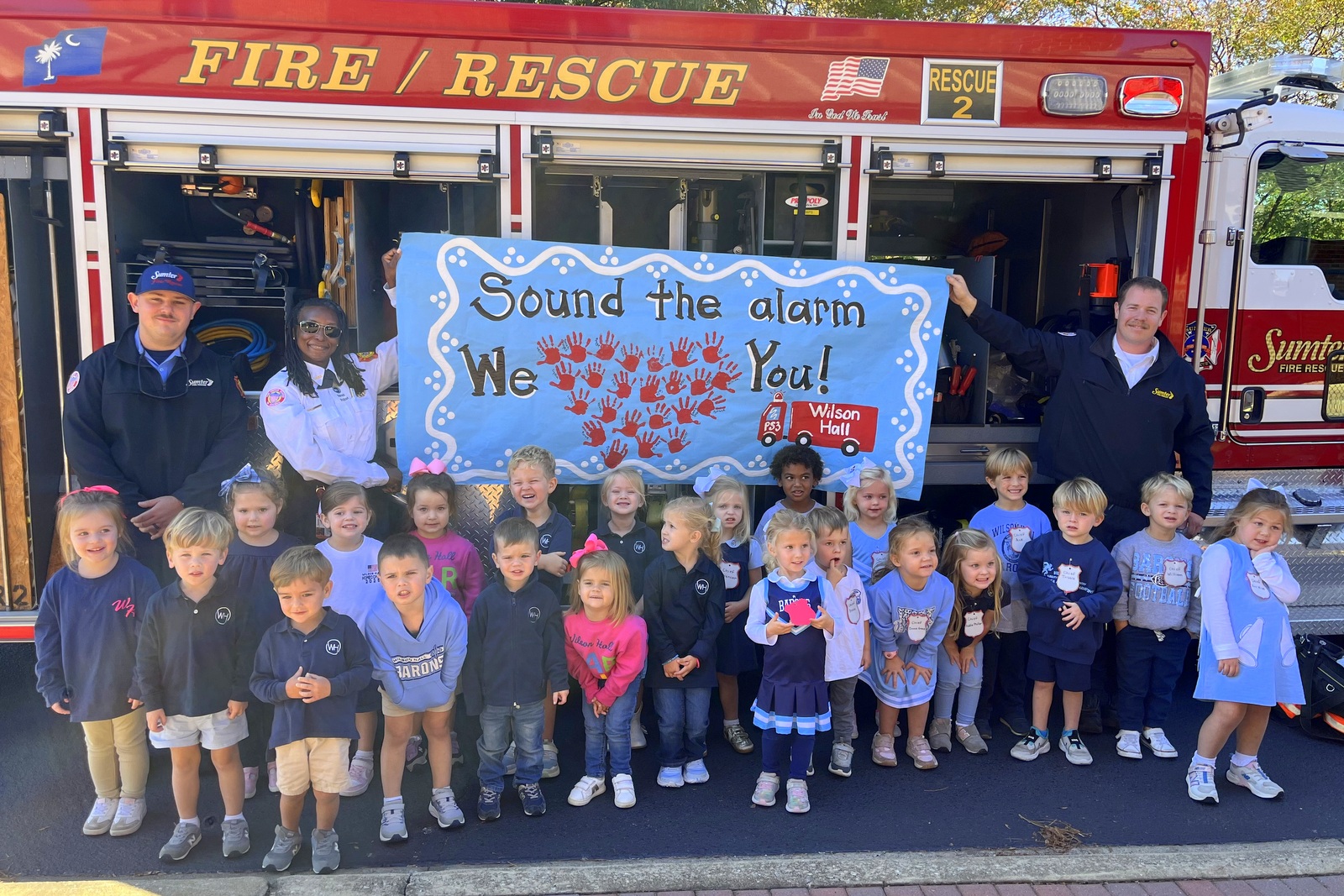
Preschool 3 students welcomed special guests as the Sumter Fire Department visited the campus for Fire Safety Week. Students learned about what is hot and how to stay at least three feet away from these items, what a fire alarm sounds like, how to call 911 in an emergency, and what firefighters do to protect our community. The highlight, of course, was seeing the fire engine.
Preschool 4 Learns Fire Safety
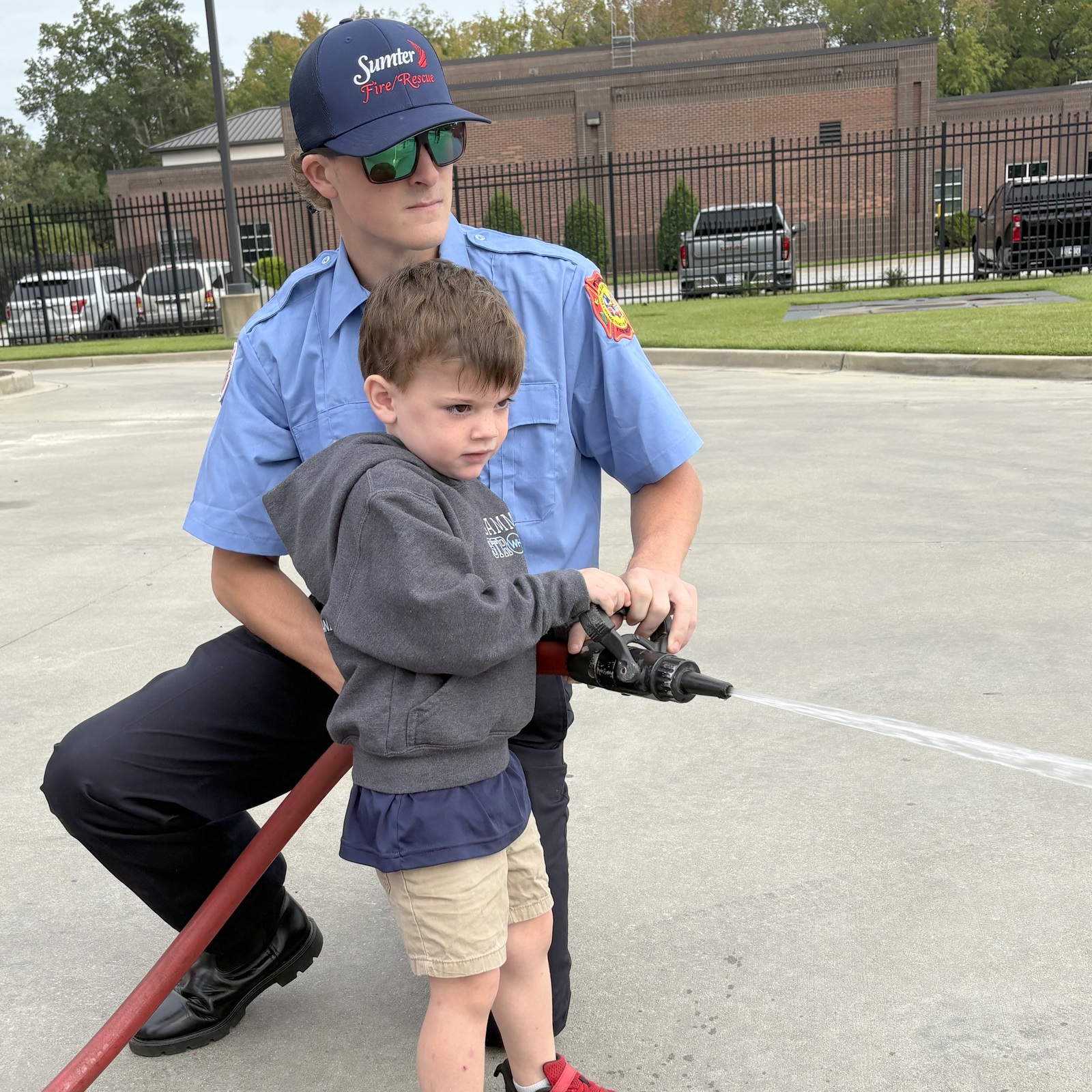
Experiencing real-world safety skills firsthand, Preschool 4 students visited the Sumter Fire Department headquarters, where firefighters taught essential lessons on fire safety. Students practiced dialing 911 and took turns using a firehose, turning an exciting field trip into a memorable educational opportunity.
Sensory Learning in an On-Campus Pumpkin Patch
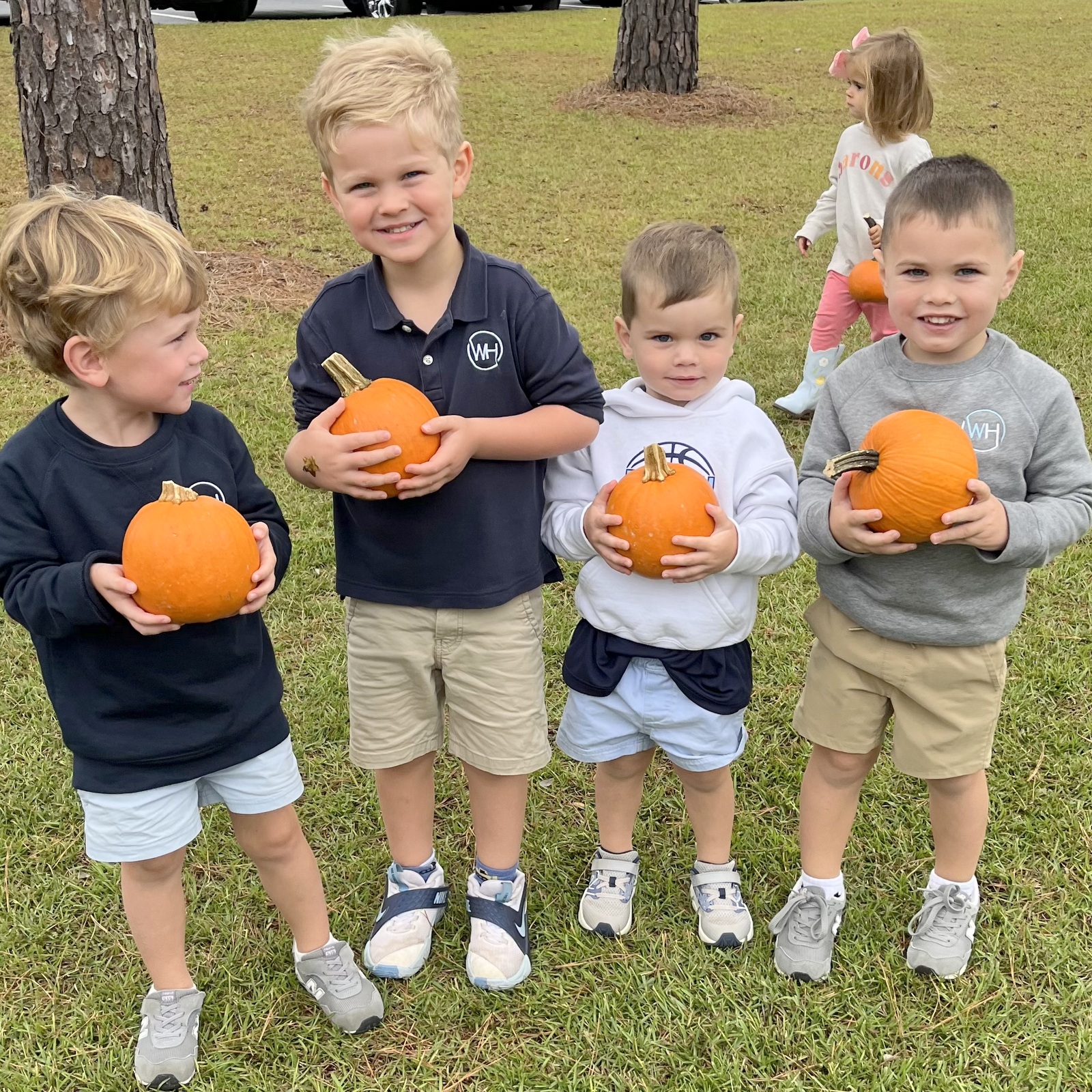
Preschool 3 popped into their very own on-campus pumpkin patch, where every student found the perfect pumpkin. After a lively game of Pass the Pumpkin, they tasted and smelled all things pumpkin to explore their senses.
Helping Hands with Nurse Sanders
.jpg)
Preschool 3 welcomed Mrs. Allyson Sanders, school nurse, as part of October’s study of community helpers, and she turned health care into hands-on learning. After unpacking her medical bag and sharing her passion for nursing, she read a story about germ prevention, modeled proper hand hygiene, and talked about healthy eating. Students practiced real-world skills by putting on latex gloves, “wrapping” pretend injuries, and bandaging themselves and stuffed “booboos,” discovering how a school nurse helps them feel safe and well at school.
Mad Scientist Morning

By turning curiosity into experiments and teamwork into discovery, middle schoolers dove into Mad Scientist Morning. Led by faculty teams, students rotated through three grade tailored stations selected from nine total labs, building skills in observation, measurement, and clear communication. Examples included Hot Wheels ramps to study friction, balloon rockets to feel Newton’s third law in action, Bendy Veggie to explore osmosis, Feeding the Fungi to decide if yeast is living, and Germ Gel to see how bacteria spread. Collaboration kept chemistry, physics, and biology buzzing throughout the morning. Mrs. Mindy Busch and Mrs. Cecelia Ormond, science teachers, and Mrs. Teresa Alexander, Assistant Director of Academics, coordinated the event.
Third Graders Step Into Sumter’s Past
.jpg)
Exploring local history through hands-on learning, third grade students visited the Sumter County Museum to deepen their understanding of our community’s past. A puppet show presented by the Sumter Junior Welfare League introduced key historical figures and events in an engaging, age-appropriate format. Students then toured the backcountry homestead, where authentic structures such as a settler’s house, commissary, blacksmith shop, and loom house brought early 19th-century life to life, reinforcing classroom lessons through immersive, real-world experience.
AP Biology Students Analyze Osmolarity
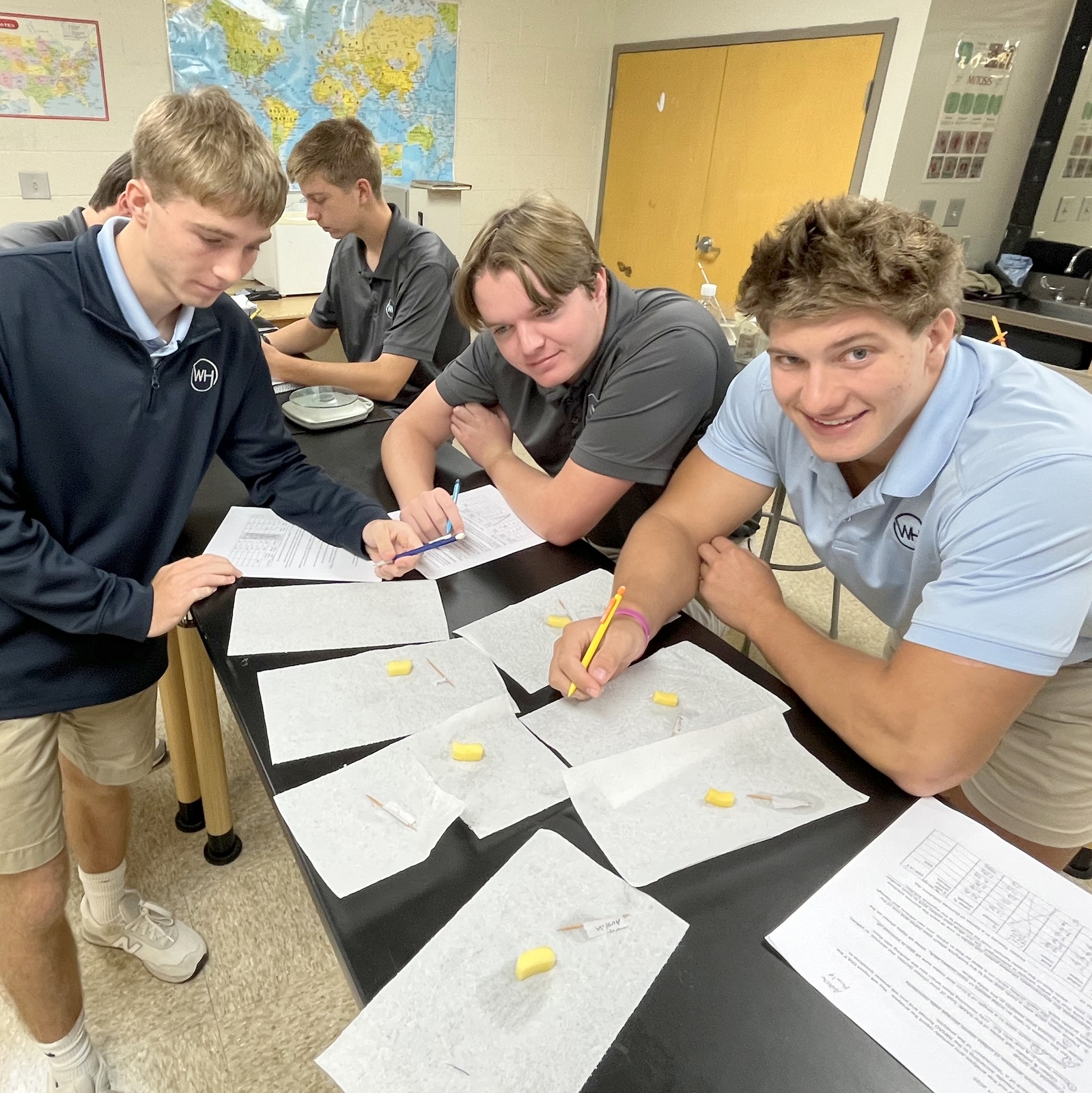
Students in Mrs. Sheri Singleton’s AP Biology class deepened their scientific skills by conducting a quantitative analysis of potato starch storage cell osmolarity, carefully designing and carrying out experiments to gather reliable data. Following the IMRAD format, they structured their reports to explain the research purpose, detail experimental methods, present measured results, and evaluate the significance of their findings in a clear, professional style.
Creative Learning with the Letter C
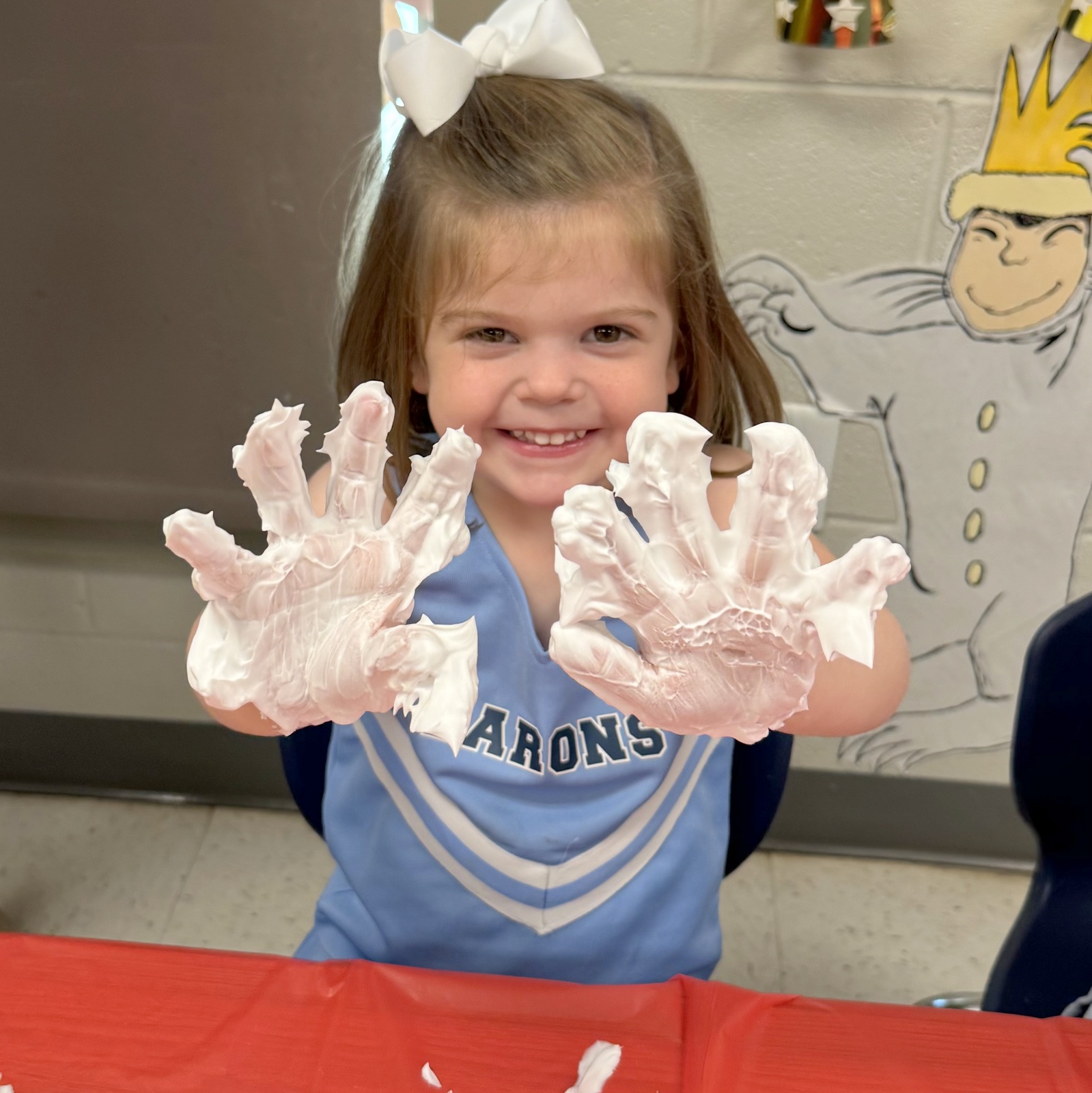
Curiosity and creativity came alive as Preschool 3 students explored the letter C through shaving cream sensory play. This STEAM-inspired activity encouraged open-ended discovery while strengthening fine motor skills, turning a simple hands-on experience into a fun and engaging way to learn.
Stars Without a Heaven: Children in the Holocaust Exhibit at Wilson Hall
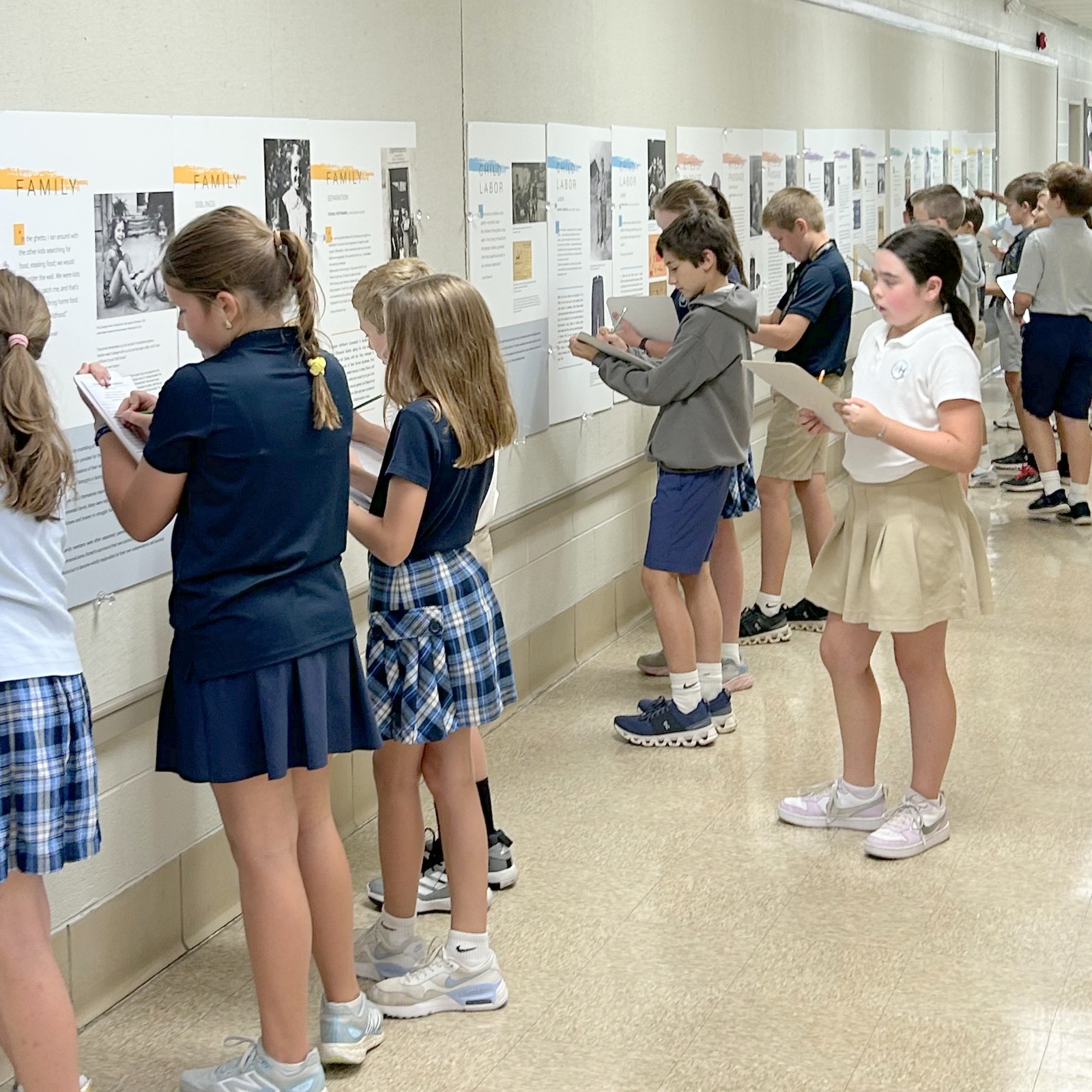
This week, Wilson Hall is honored to host Stars Without a Heaven: Children in the Holocaust, a moving 27-panel traveling exhibit on display in the 300 Building. On loan from the South Carolina Council on the Holocaust and coordinated by librarian Mrs. Hayes Jones, the exhibit shares the stories of children who lived through the Holocaust, captured through drawings, poems, letters, and toys. While 5th-grade classes will study it as part of their curriculum, the age-appropriate content offers meaningful insight for middle school, high school, and adult audiences alike.
Numbers Come Alive in Pre-Algebra
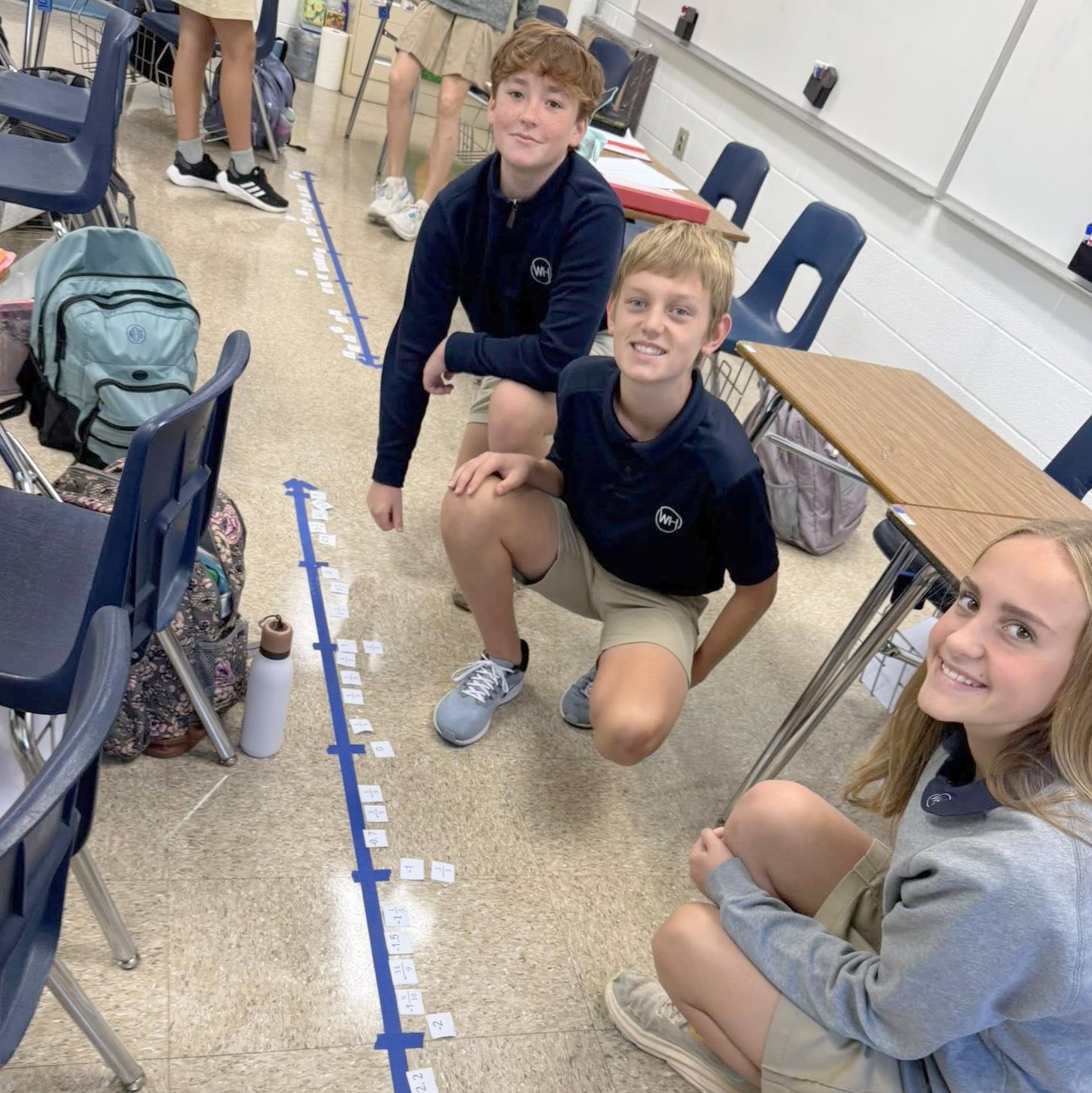
Walking along a floor number line, students in the 7th grade Pre-Algebra I Plus class, taught by Mrs. Teresa Alexander, plotted positive and negative rational numbers with accuracy and collaboration. The hands-on activity transformed abstract ideas into tangible learning, helping students visualize numerical relationships while strengthening their problem-solving skills. Multimodal learning and teamwork made the lesson an engaging and effective STEAM experience.
4th Graders Put Energy in Motion
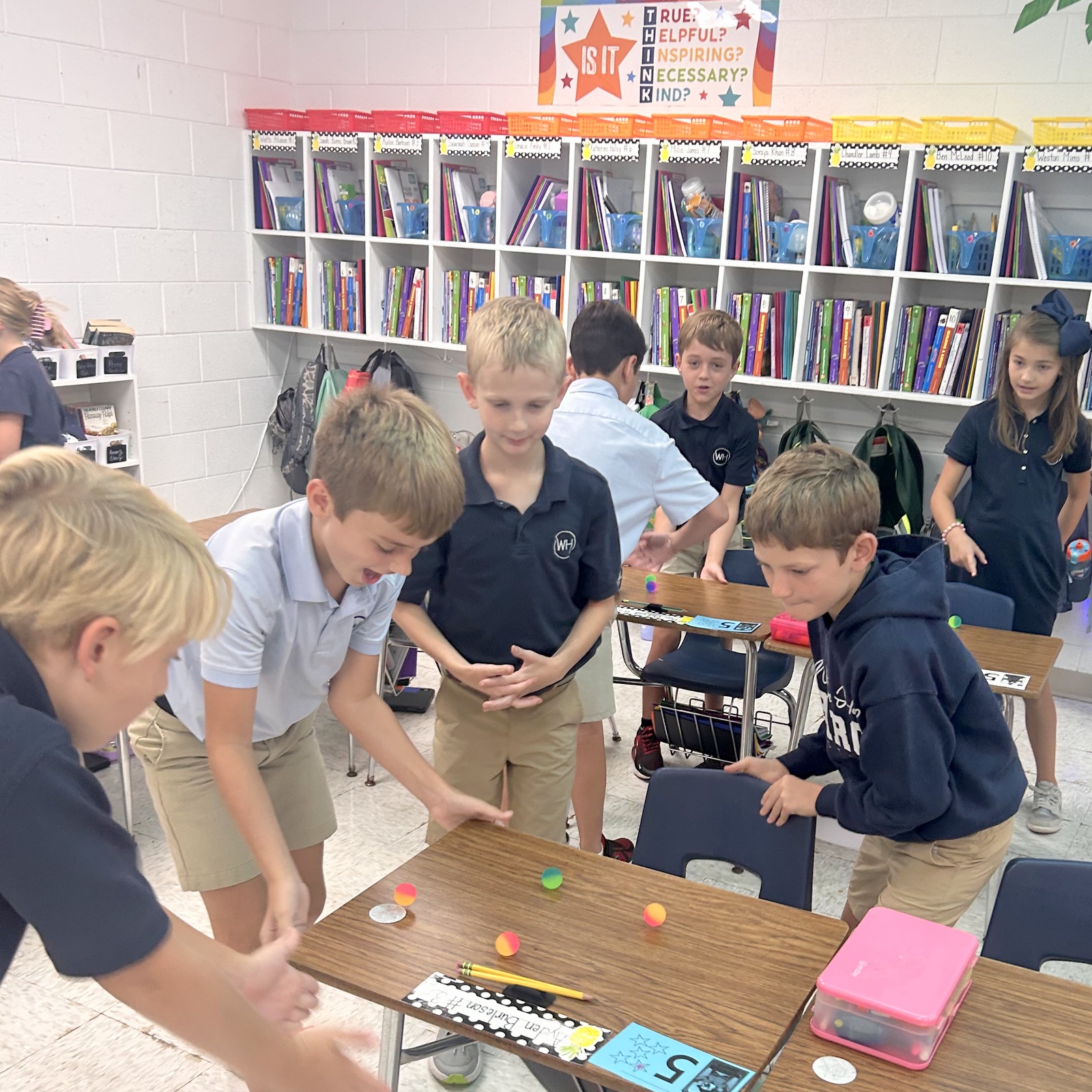
Conducting hands-on experiments, 4th grade students in Mrs. Megan Zimmerman’s class explored the exciting world of energy through engaging science activities. From testing the transfer of energy to investigating the effects of collisions, the classroom buzzed with curiosity and discovery. The STEAM-focused lesson not only deepened their understanding of science but also encouraged collaboration as students worked together to test ideas, share observations, and learn from one another.
Skits, Smiles & the Constitution
.jpg)
Collaboration and creativity took center stage as students in Mr. Sean Hoskins’ government class acted out skits to bring the Bill of Rights to life. Using what they had learned in class as a review for an upcoming test, students worked in small groups to pantomime three assigned rights without saying a word. The other groups then guessed both the amendment and the right being performed, turning review time into a lively mix of learning, teamwork, and laughter.
Making Sense of Matter in Physical Science
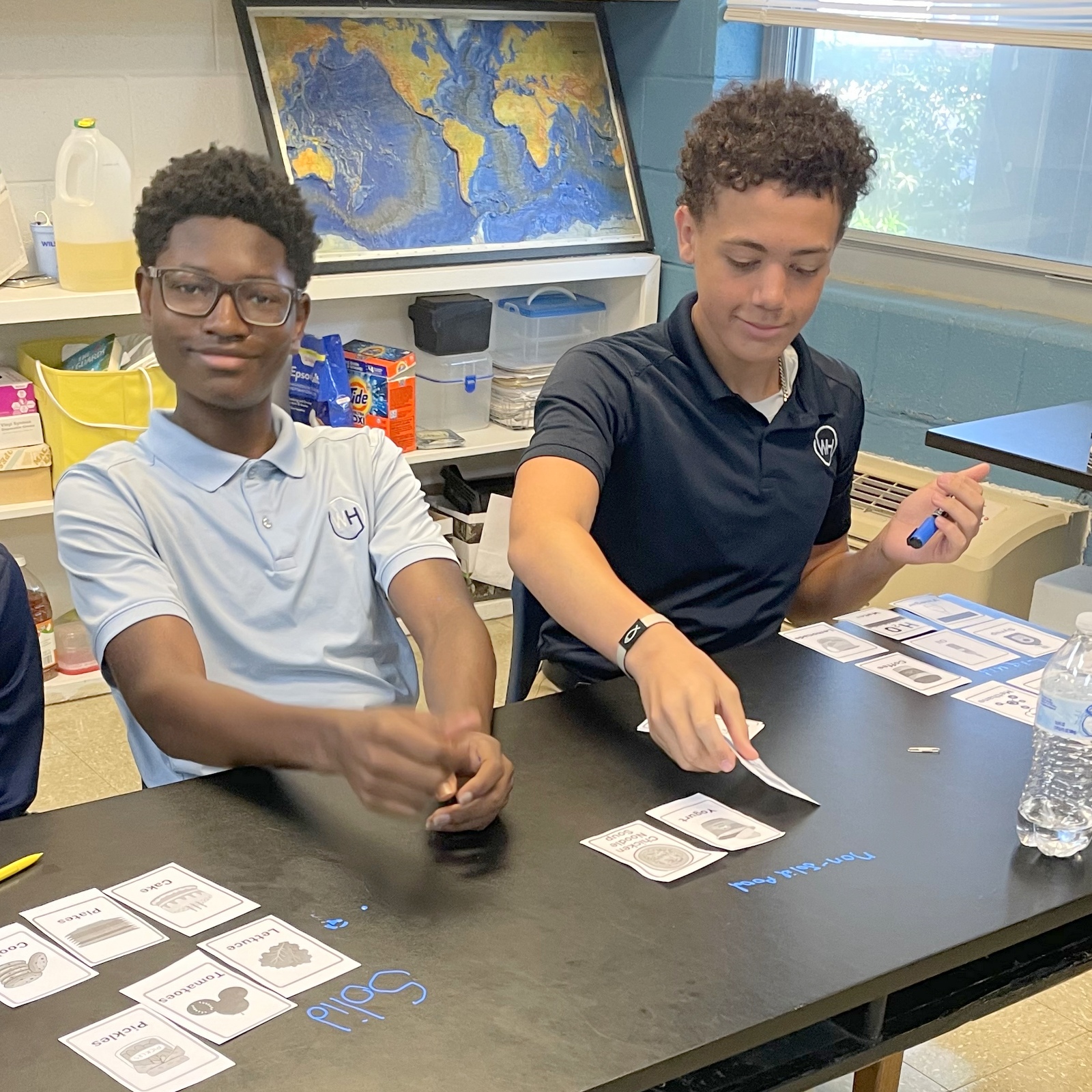
Sorting, debating, and organizing turned into a hands-on way for students in Mrs. Ashley Morris’ Introduction to Physical Science class to dive into matter classification. Armed with 30 cards, each group was challenged to invent its own system for classifying the substances. The activity sparked plenty of creativity and discussion, helping students see how scientists break down and organize the building blocks of matter.
Reading with a Positive Perspective
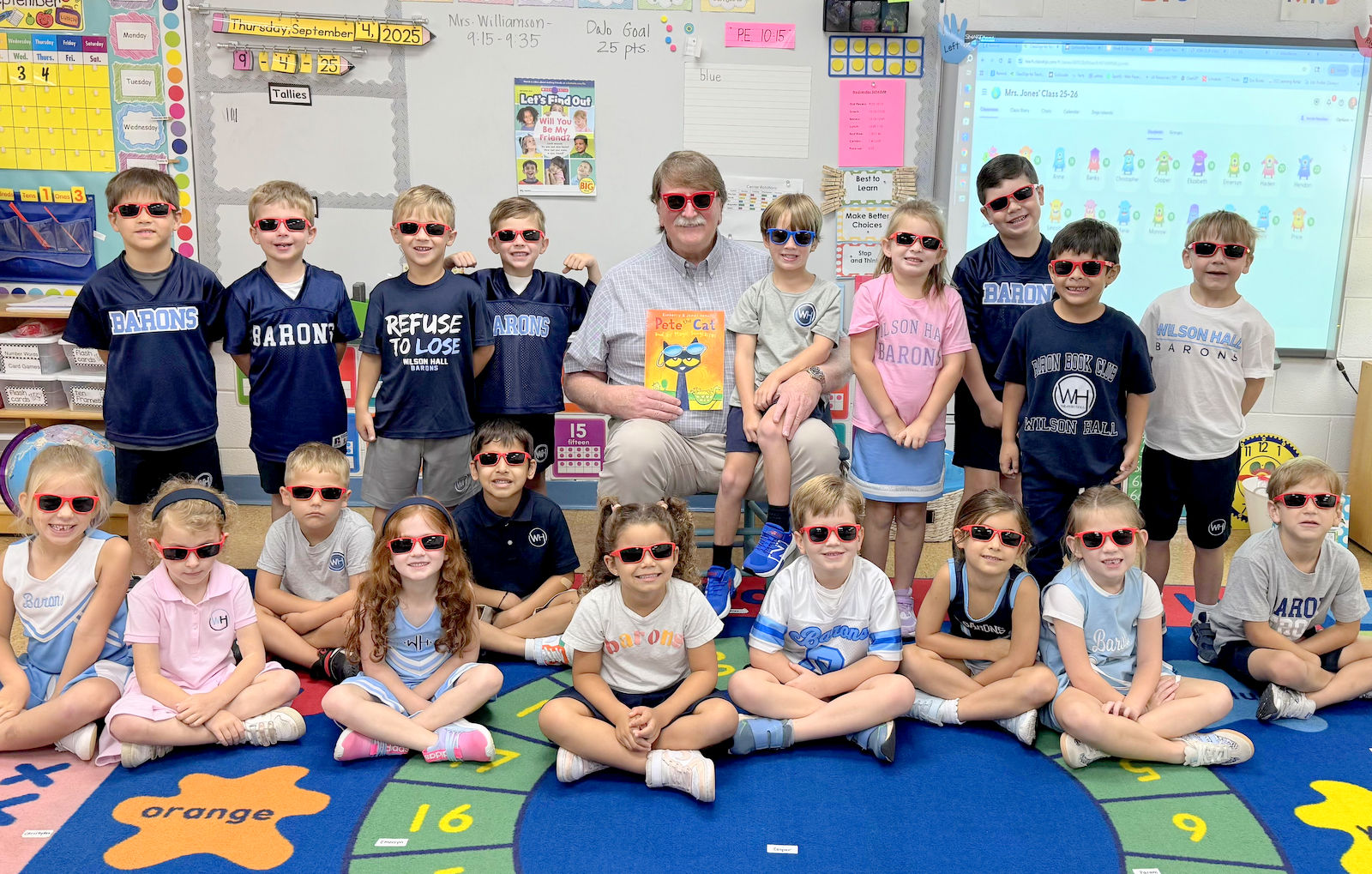
As a surprise, Mr. Shep Sublette, a ‘74 WH graduate and grandfather of kindergarten student Banks Timmons, stepped into the classroom as the Mystery Reader. He brought the story Pete the Cat and His Magic Sunglasses to life, reminding everyone about the power of looking at things with a positive perspective. To make the lesson even more special, he handed out a pair of “magic glasses” to each student to take home.
Best in Show: Kindergarten Edition
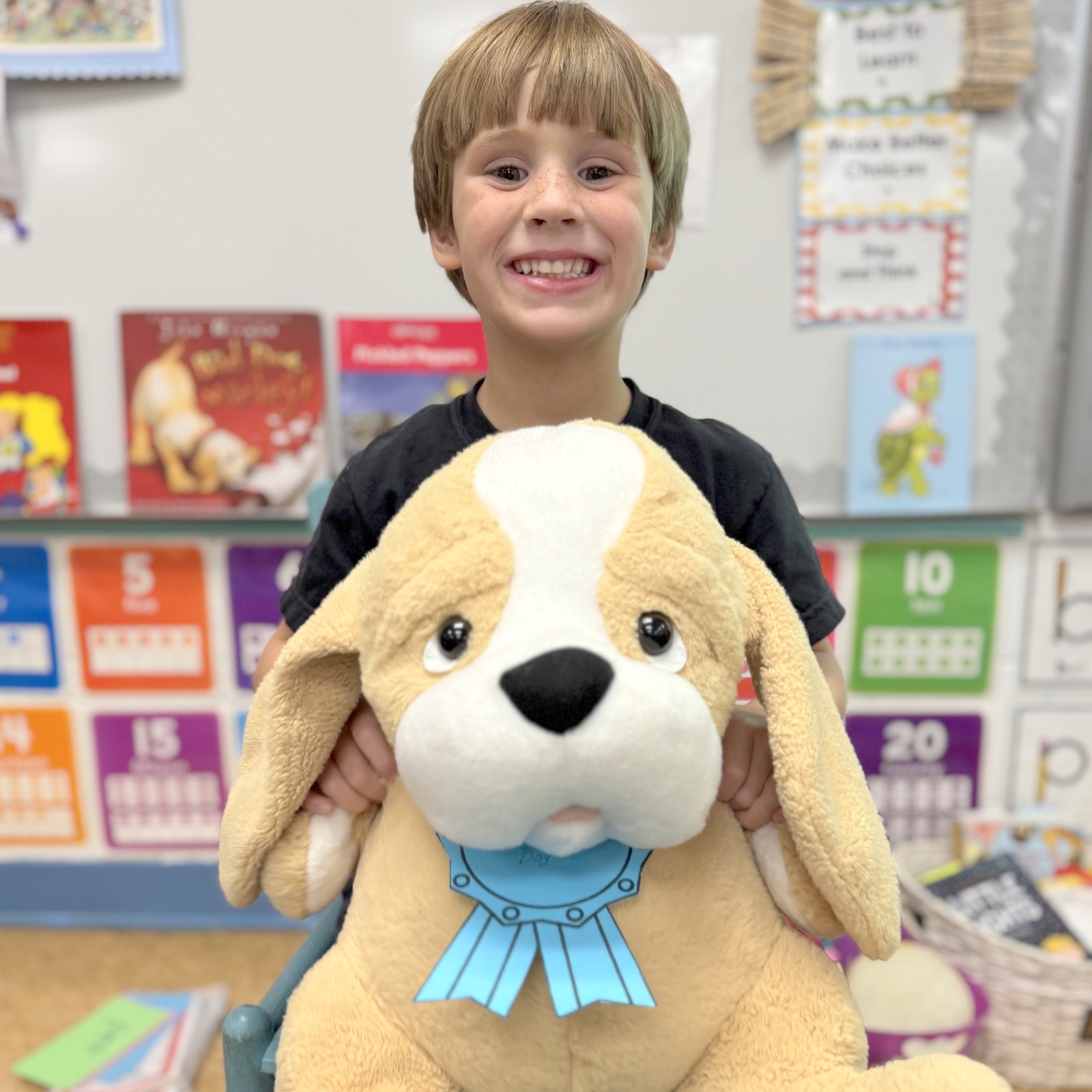
To help transition into the new school year, kindergarten students read Boomer Goes to School by Constance W. McGeorge. For a fun activity, they held a lively dog show, proudly presenting their favorite stuffed dogs, each one earning a playful blue ribbon for special characteristics like Happiest Dog, Fluffiest Dog, and more.
Apples, Appleseed & the Letter A

Hands-on learning made the letter “A” come alive for Preschool 3 students as they tasted green, red, and yellow apples, giving each a thumbs up or down. Along with exploring healthy eating and how apples grow on trees, they discovered the story of Johnny Appleseed and enjoyed songs and poems that tied to their letter of the week.
Sweet Statistics in AP Psychology
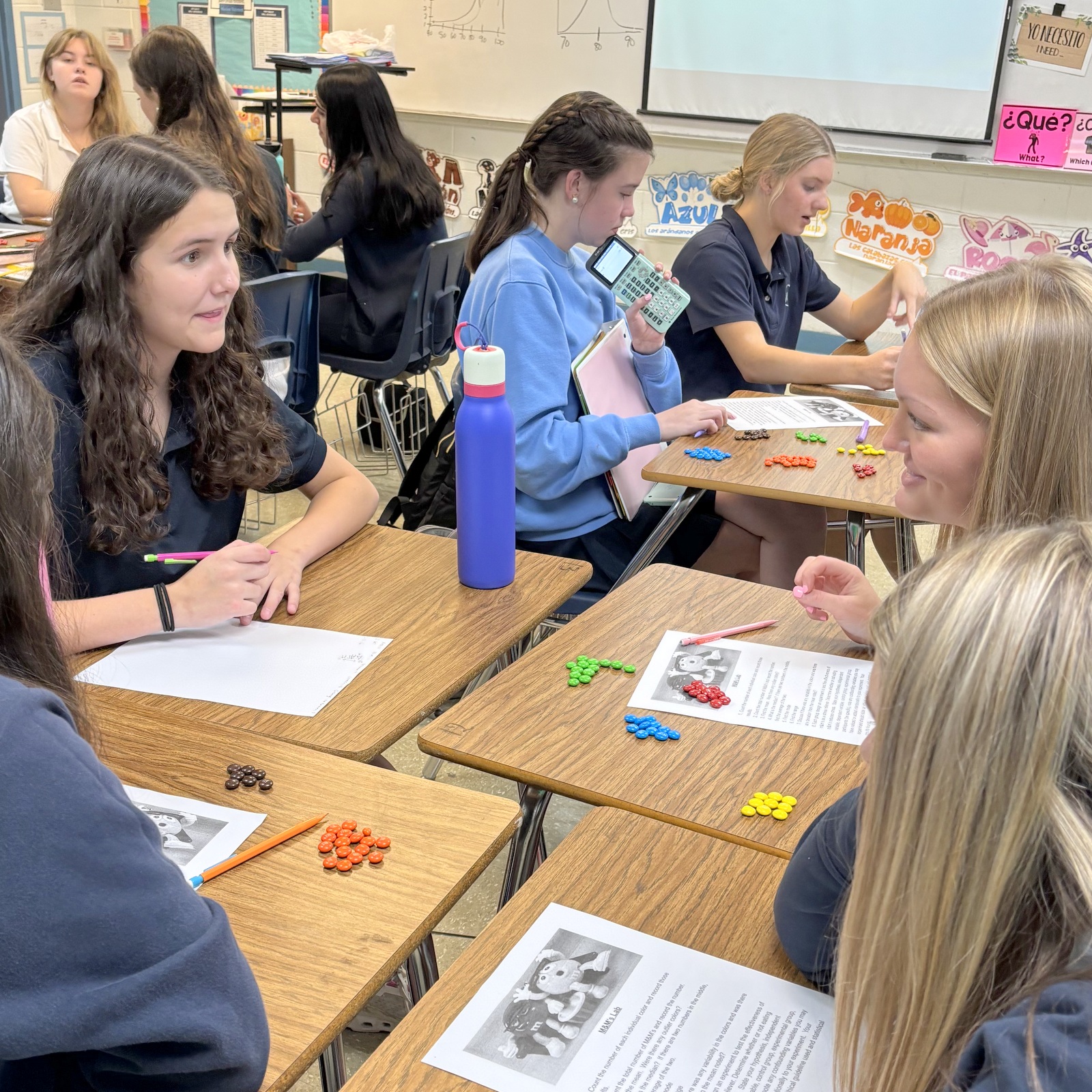
Students in Mrs. Allyson Sanders’ AP Psychology class turned a bag of M&M’s into a hands-on experiment to study research design, ethical guidelines, and statistical reasoning. After forming hypotheses about color distribution and collecting data, they considered ethical factors such as informed consent and inclusivity before analyzing their results with descriptive statistics and chi-square testing. This creative activity gave students a practical way to see how psychologists design studies, uphold ethical standards, and interpret data.
Mapping the Human Body
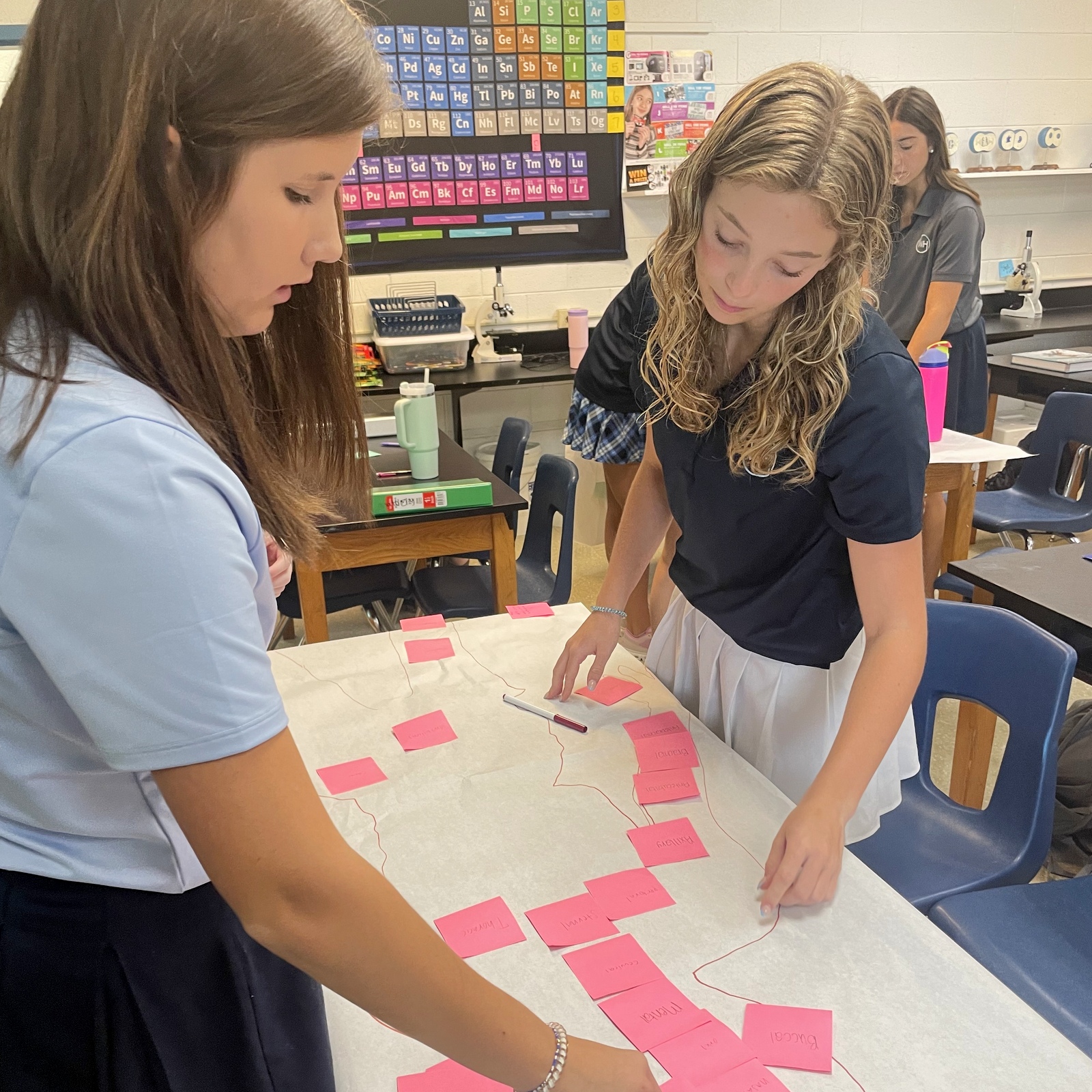
Students in the Honors Anatomy class, taught by Mrs. Ashley Morris, engaged in a hands-on STEAM group activity to practice body region terminology. Working together, students traced an outline of a classmate’s body on the floor and then used colorful post-it notes to label the different anatomical regions. This interactive approach reinforced their learning while making the study of anatomy both collaborative and memorable.
Environmental Science "Tragedy of the Commons"
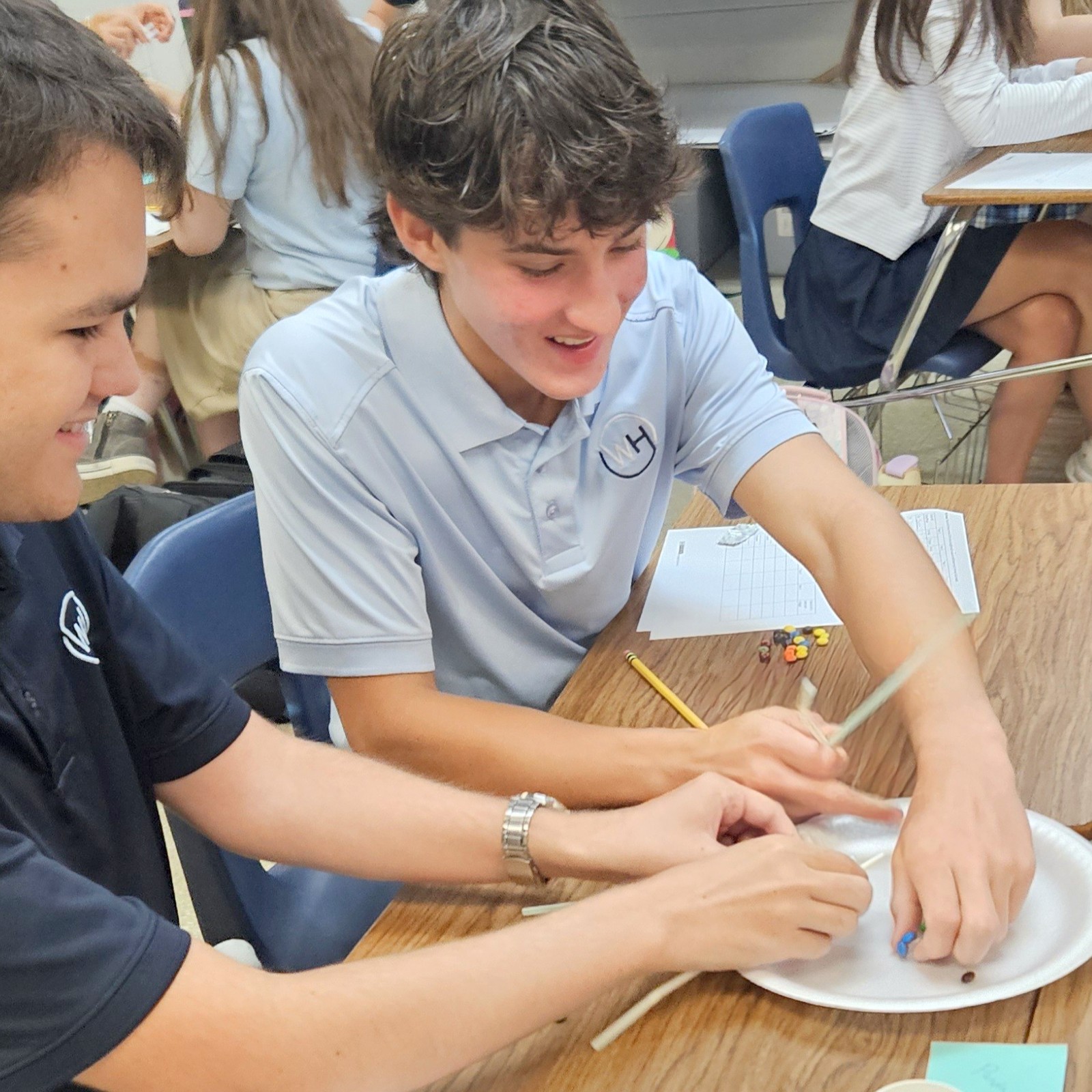
Using straws to “fish” for M&Ms in their community lakes, students in Mrs. Jessica Duke’s Environmental Science class experienced the challenges of the Tragedy of the Commons. In the first round, with no rules in place, most of the lakes were quickly depleted as students acted in self-interest. In the second round, they introduced regulations and worked together, allowing their lakes to thrive and demonstrating that sustainability depends on balance, cooperation, and mindful choices.
Human Health & Development Learn the Baby Basics
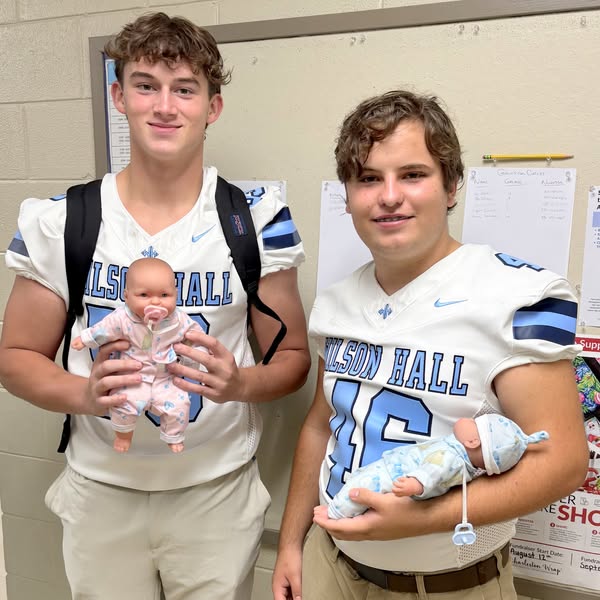
Life with a baby can turn ordinary routines upside down, and students in Mrs. Allyson Sanders’ Human Health & Development class got a taste of that reality. After exploring the physical, cognitive, and psychosocial stages of child development, each student was assigned a baby doll to care for day and night throughout the week. The project wrapped up with presentations showing just how much an infant can change family life, from shifting roles and added responsibilities to the challenges of finances and relationships.
A Heartfelt Lesson from The Kissing Hand
.jpg)
Preschool 3 students enjoyed The Kissing Hand, the heartwarming story of Chester the raccoon who overcomes his first-day jitters when his mother kisses his hand so he can always carry her love with him. To bring the story to life, students had a heart drawn on their hand, a sweet reminder that whenever they feel scared, they can look at their hand and remember their mother’s love.
First Graders Make Colorful Connections with the Skittles Ice Breaker
.jpg)
First grade students kicked off the year with a colorful “Getting to Know You” activity called the Skittles Ice Breaker. After sorting their Skittles by color, the students rotated around their table groups, sharing fun facts about themselves and making new connections in a fun and engaging way.
Robotics Students Face Off in BattleBots Competition
.jpg)
Students in the robotics classes taught by Mrs. Leann Tuders put their engineering and programming skills to the test during an exciting BattleBots competition. BattleBots is a hands-on robotics event in which student-built robots compete in head-to-head matches, attempting to disable or outmaneuver their opponents in a controlled arena. The competition encourages creativity, problem-solving, and teamwork as students apply their classroom knowledge in a fun and competitive environment. Wilson Hall offers three years of robotics in high school as well as a quarter-long robotics class for all 7th grade students, giving them early exposure to STEAM learning.
Anatomy Heart Dissection
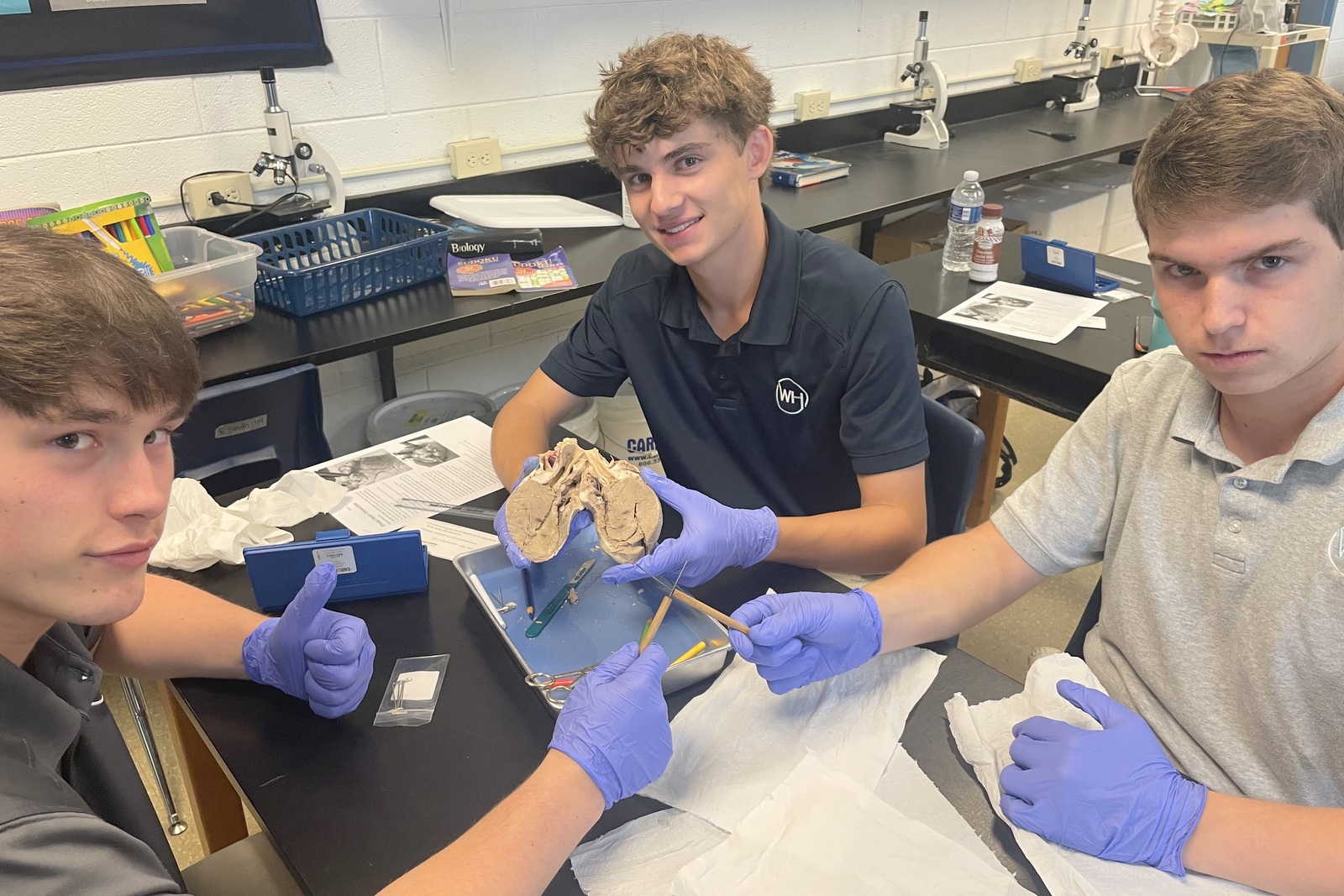
Putting their knowledge to practical use, students in the anatomy class dissected sheep hearts, using pencils to mark the main vessels and identify key structures. This hands-on activity is just one example of how STEAM learning comes to life in the classroom. Taught by Mrs. Ashley Morris, the lesson combined scientific inquiry, critical thinking, and practical application to deepen students’ understanding of the human cardiovascular system.
Health & Human Development Class Holistic Wellness
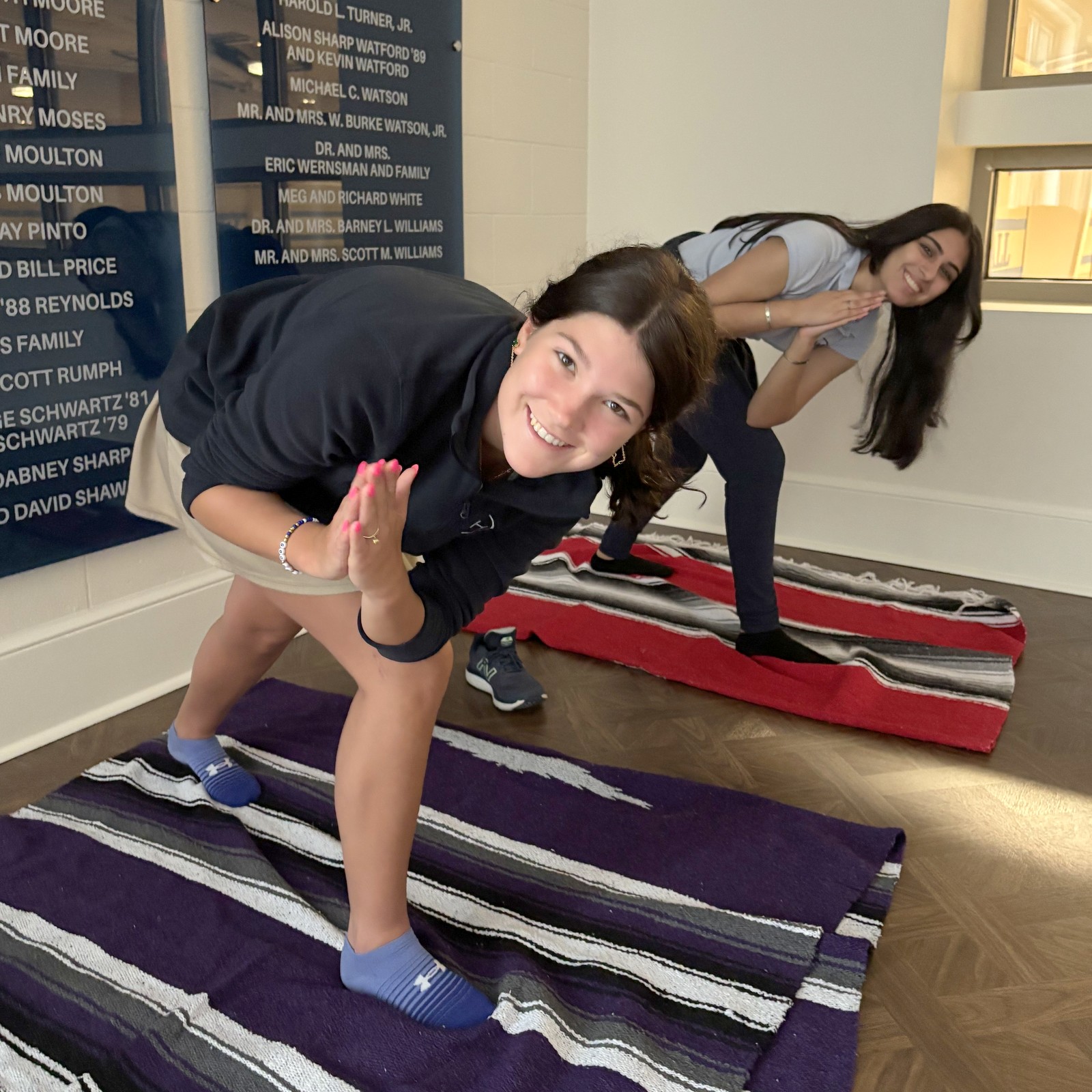
While studying different types of treatment and therapy, students in the Health & Human Development class participated in a hands-on series exploring meditation, pet therapy, sound therapy, and yoga. The engaging activities offered students a deeper understanding of holistic wellness practices. The class is taught by Mrs. Allyson Sanders.
AP English Language Combine

AP English Language students tackled the AP Combine, a fun and fast-paced training session designed by Mrs. Molly Matthews to prepare them for the upcoming College Board exam. Combining academic rigor with physical challenges, students practiced switching between essay tasks while also skipping and running backwards on the track, performing ballet moves on the football field, and sprinting around the stone circle. It was a creative and energizing way to sharpen skills while learning outside of the classroom.
Preschool 3 Western Day for Letter W
.jpg)
Preschool 3 ended their letter W week in the best way—with Western Day! Students practiced numbers and colors, played fun games, enjoyed tasty treats like cowboy and cowgirl barrel drinks, learned a new dance, and raced their own handmade horses across campus. What a wonderful way to celebrate W!
Robotics I Battlebot
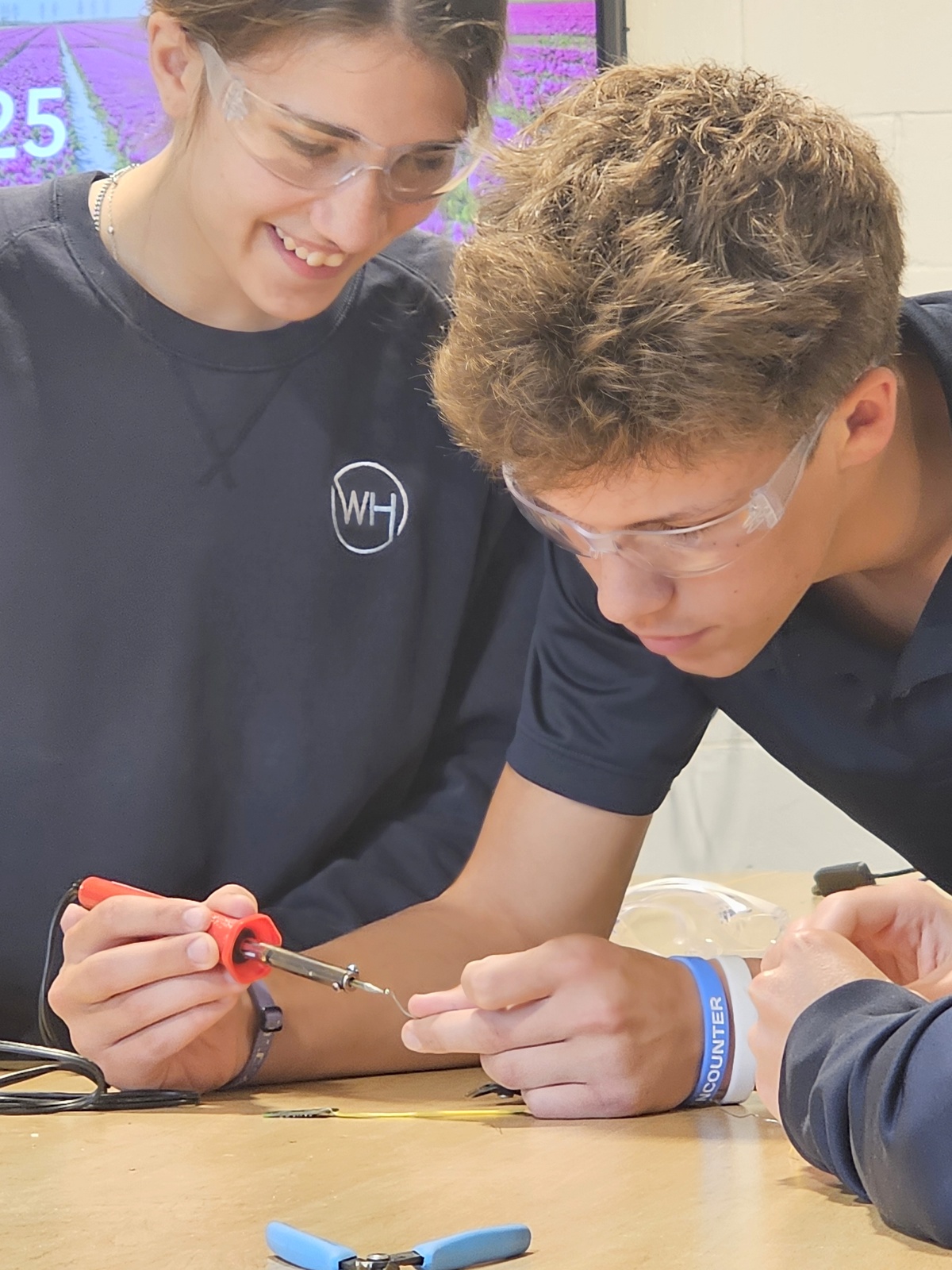
Students sharpen their soldering skills as they build their Battlebot in preparation for an upcoming competition. Under the guidance of Mrs. Leann Tuders in Robotics I, these future engineers are getting ready to put their creation to the test. WH offers three years of both engineering and robotics to high school students, giving them hands-on experience and a head start in STEAM.
Pre-Algebra I "Glow Up"
.jpg)
Pre-Algebra I Plus got a glow-up! Mrs. Teresa Alexander’s 7th grade students lit up the classroom—literally—with their “Glow Up Your Graph” STEAM review. Stations, black lights, and fluorescent fun made test prep shine bright as students engaged with math through creative, hands-on learning. A great example of using diverse teaching methods to make learning stick.
Biology DNA Lab
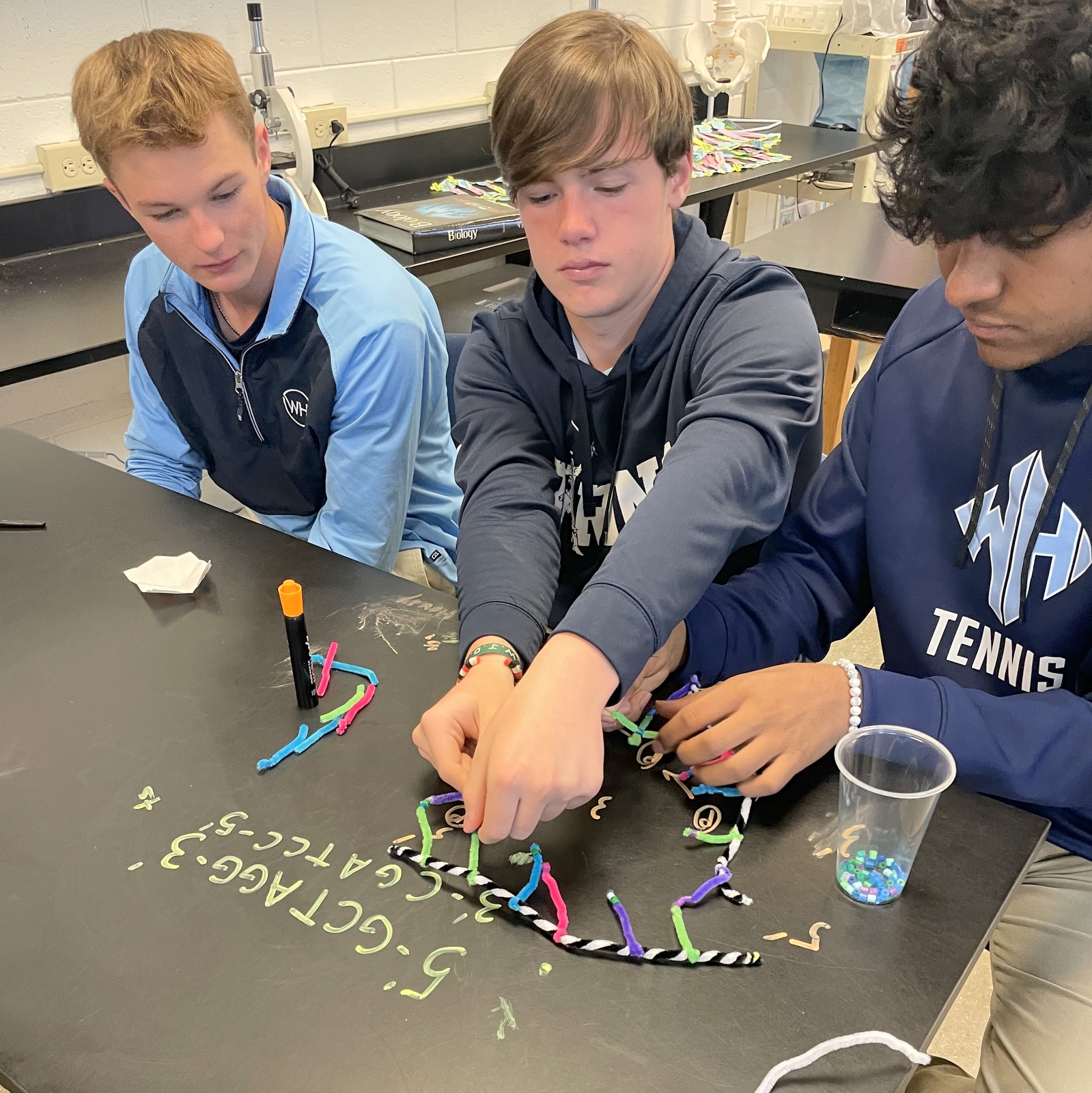
In biology class, students recently participated in a hands-on STEAM activity to explore the process of DNA replication. Using colorful pipe cleaners to represent the different components of DNA, students constructed and modeled the replication process in a fun and interactive lab. This creative approach helped reinforce key concepts while encouraging collaboration, critical thinking, and a deeper understanding of the structure and function of DNA.
Anatomy Brain Hats
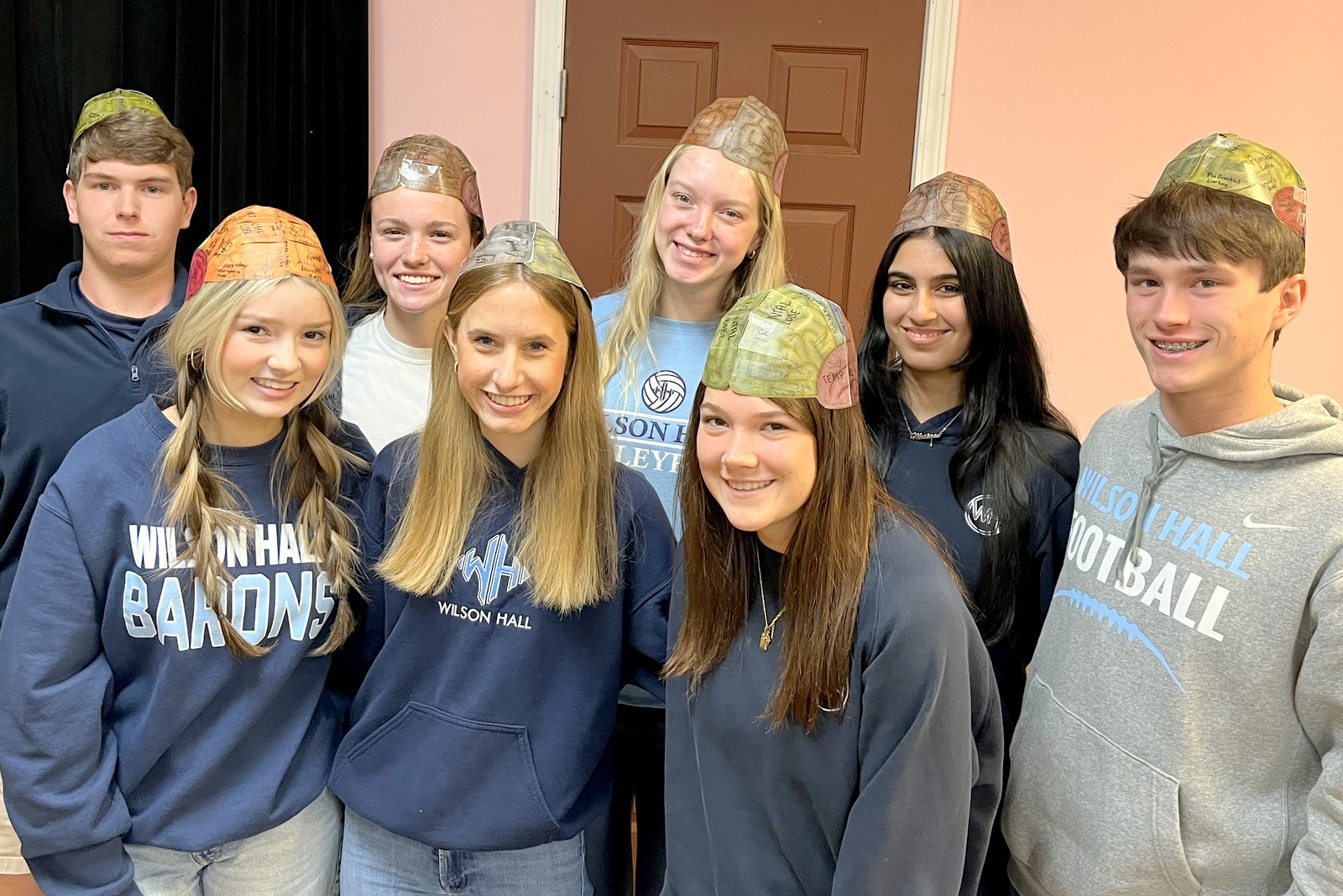
In an engaging STEAM activity, students in the anatomy classes, taught by Mrs. Ashley Morris, wore brain hats as part of a creative project to prepare for an upcoming test. The students designed and crafted their own hats, labeling the different areas of the brain and their functions. To reinforce their learning, each student wore their brain hat throughout the day, while teachers were given questions about the brain to ask the students. This interactive review session provided an opportunity for students to earn extra points while reinforcing key concepts in a fun and memorable way.
Spanish 3 STEAM Game
.jpg)
Spanish 3 Honors students bring learning to life with a STEAM-inspired Snakes and Ladders game, practicing the subjunctive mood in a fun and interactive way in Mrs. Emily Jackson’s class.
Kindergarten St. Patrick's Day STEAM Activity
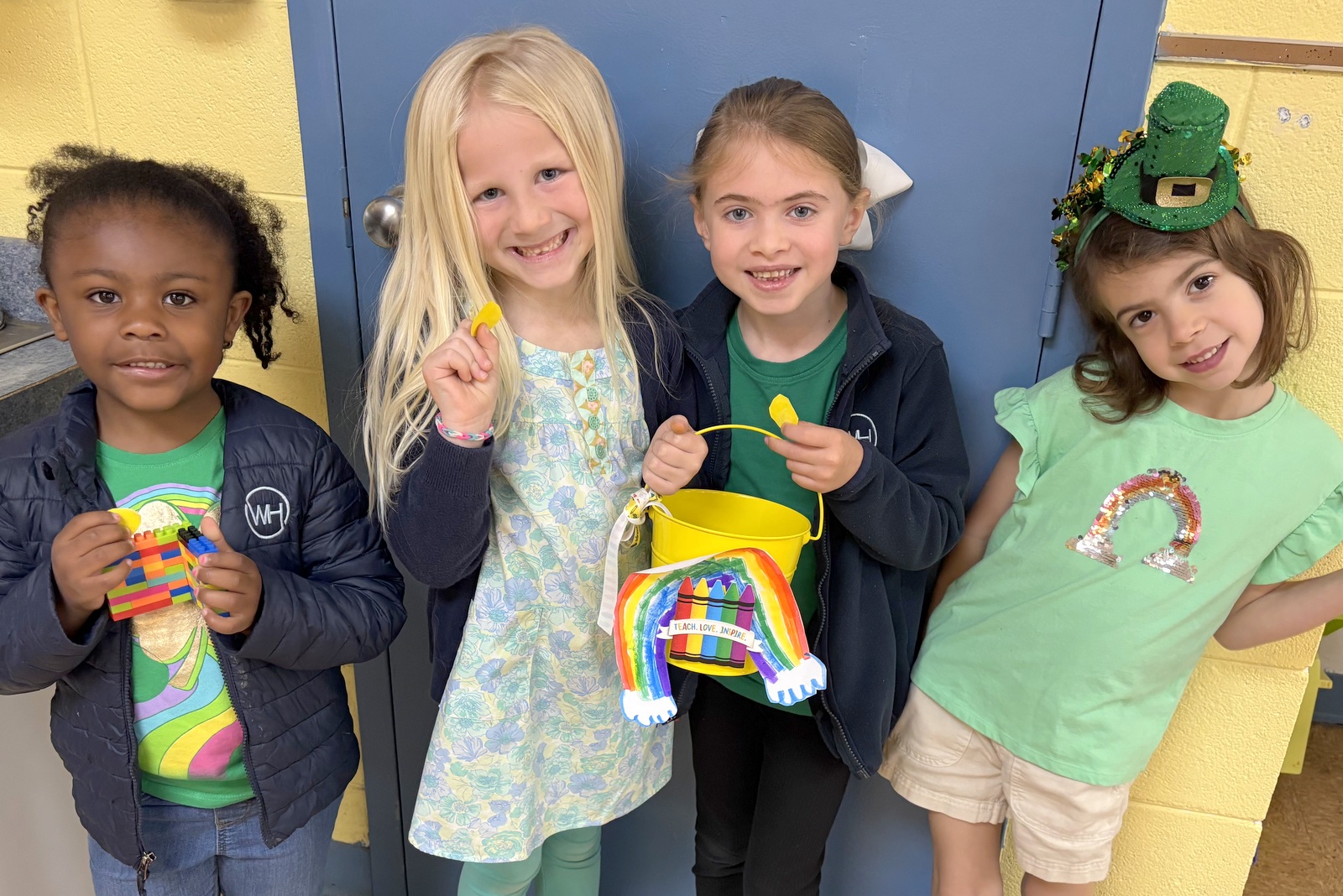
In an early celebration of St. Patrick's Day, kindergarten students engaged in a fun STEAM activity by designing and building their own "leprechaun traps," sparking creativity and problem-solving skills.
7th Grade Pre-Algebra Recognizes Pi Day
.jpg)
In celebration of National Pi Day on 3/14, students in Mrs. Teresa Alexander’s 7th grade Pre-Algebra I Plus class and Mrs. Sarah Barnes’s 7th grade Pre-Algebra I class took their learning outdoors for a hands-on STEAM project. Using chalk, they drew circles and applied their knowledge to identify diameter, perimeter, circumference, and radius while enjoying the sunshine.
Environmental Science Water Pollution Simulation

The Environmental Science class, taught by Mrs. Jessica Duke, concluded its unit on water pollution with a hands-on lab activity designed to simulate an oil spill. Students constructed model beachfronts and introduced vegetable oil into the water to replicate the effects of a tanker spill. Working in groups, they devised and implemented various cleanup strategies, experimenting with materials such as sponges, baking soda, detergents, vinegar, flour, and coffee filters to determine the most effective method. Through this engaging activity, students gained a deeper understanding of the challenges and complexities involved in real-world oil spill cleanup efforts.
Dr. Seuss Celebration
.jpg) Preschool 3, Preschool 4, and Kindergarten students had fun celebrating Dr. Seuss Week, a fun-filled event that brings stories to life while promoting literacy and a love for reading. Each day, they dove into a new Seuss classic, from The Cat in the Hat to The Lorax, engaging in hands-on crafts and activities that matched the theme of the book. They played exciting games like “Mix Up the Shoes” to practice matching pairs and giggled their way through Fox in Socks-inspired challenges. Special Seuss-themed snacks added a tasty touch to the festivities. Held annually in early March as part of the National Education Association’s (NEA) Read Across America initiative, this event, which coincides with Dr. Seuss’s March 2 birthday encourages young readers to embrace the magic of books.
Preschool 3, Preschool 4, and Kindergarten students had fun celebrating Dr. Seuss Week, a fun-filled event that brings stories to life while promoting literacy and a love for reading. Each day, they dove into a new Seuss classic, from The Cat in the Hat to The Lorax, engaging in hands-on crafts and activities that matched the theme of the book. They played exciting games like “Mix Up the Shoes” to practice matching pairs and giggled their way through Fox in Socks-inspired challenges. Special Seuss-themed snacks added a tasty touch to the festivities. Held annually in early March as part of the National Education Association’s (NEA) Read Across America initiative, this event, which coincides with Dr. Seuss’s March 2 birthday encourages young readers to embrace the magic of books.
